December 5, 2017 / wanderinglightning / 0 Comments
I turn my new
washed socks
and sand
sprinkles the air
like snowflakes
remember
remember the sea
Apparently so intent to hike over the highest mountains, I took the high road I had planned to skip. The Primitivo was showing itself to be a path of choices already made.
I wasn’t technically lost; my route over the third high hill I did not intend to hike was, in fact, a route on the Camino…an alternate route. I had just intended to be a slacker, but missed my slacker exit. So I got lost by staying on track, and took the Alto de la Campa – the high scenic route. The very high scenic route, off the main roadways; the good kind of missed exit, you realize later, after the point of no return is far behind you.
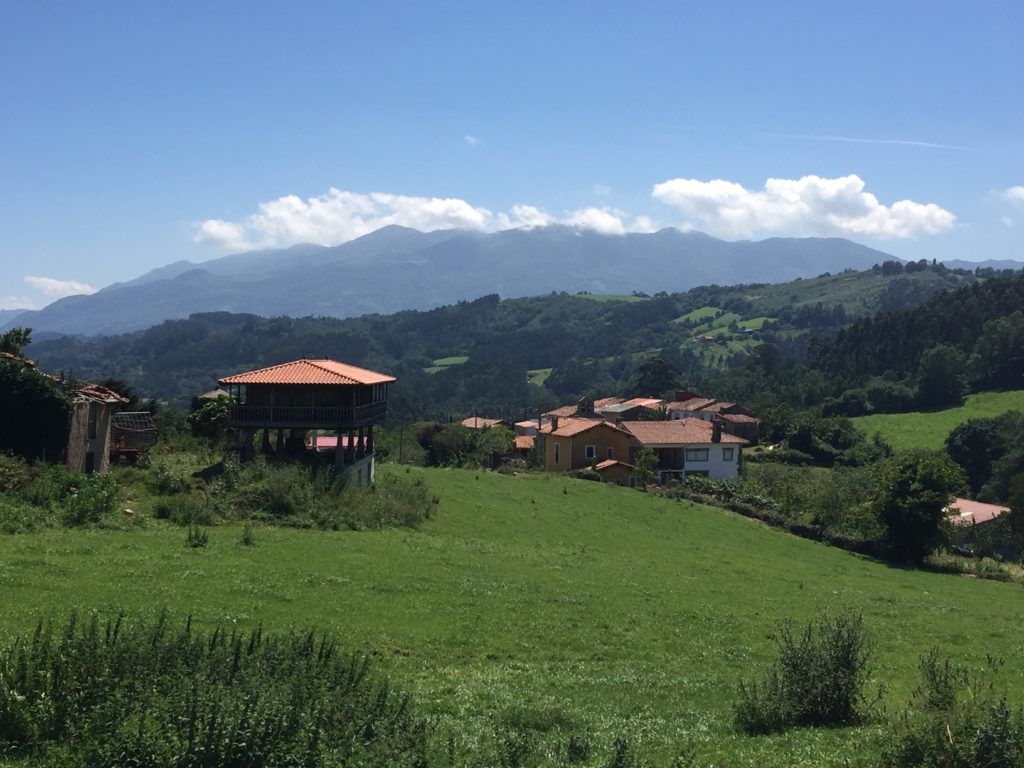
A road biker in spandex called out, “Buen Camino!”, giving me a panting thumbs-up as he passed me on the other side of the tough, steep road, both of us loaded down and climbing on. Taking the turn to Arbazal, my road became even steeper. The guidebook had said that once I reached the village, the route would flatten out and become easier. One thing was instantly clear: Smart Alex had never walked the route through Arbazal. Using only my toes to ascend the road like I was rock scrambling on the approach to a summit, I reached the top of nowhere. Green mountains stretched before me in all directions.
Walking up such precipitous roads is actually the easy part, though you’re a sweaty mess and your pack feels like a freight train going the opposite direction. It’s the downhills that will get you. It’s the choices you made earlier that tell, now.
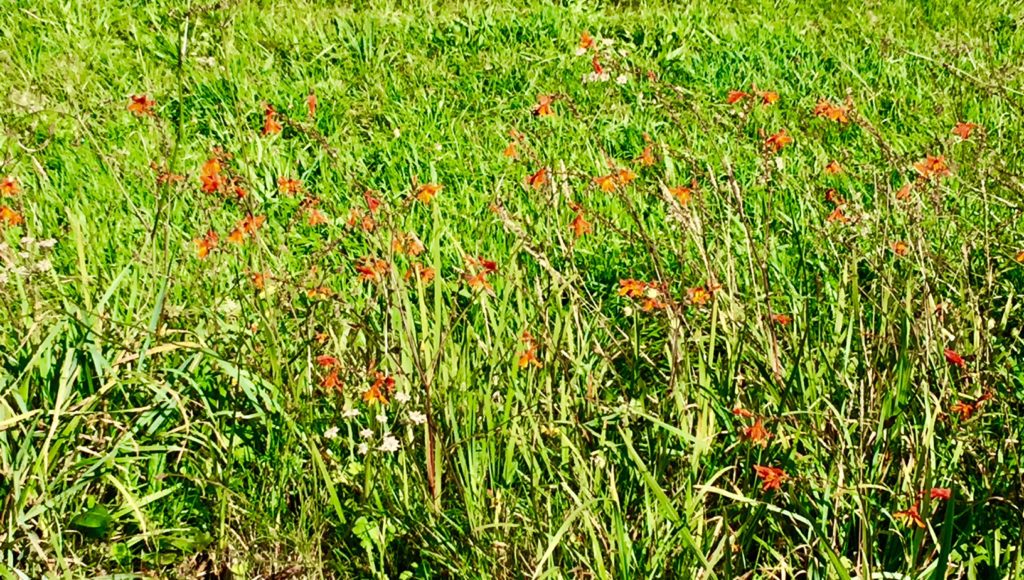 I had walked with a slightly unbalanced pack, not wanting to halt my momentum to stop and readjust, and so now my left shin was hurting, especially when absorbing the impact of the downhills, and I had a long, steep downhill before me. Several, in fact. Kilometers of downhill.
I had walked with a slightly unbalanced pack, not wanting to halt my momentum to stop and readjust, and so now my left shin was hurting, especially when absorbing the impact of the downhills, and I had a long, steep downhill before me. Several, in fact. Kilometers of downhill.
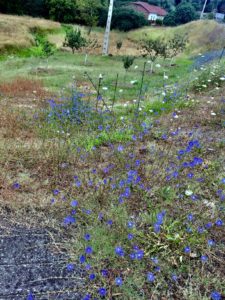 As I looked down the road, I was concerned, as a shin splint could lead to a stress fracture and could end my camino. Seventeen-year-old me winced at the thought, remembering stress fractures causing calcium deposits like goose eggs on both shins during my short-lived high school basketball days.
As I looked down the road, I was concerned, as a shin splint could lead to a stress fracture and could end my camino. Seventeen-year-old me winced at the thought, remembering stress fractures causing calcium deposits like goose eggs on both shins during my short-lived high school basketball days.
But then, she heard something.
A rhythmic music pulsed in my mind. Bomp-bomp-bomp, BAH-dah, bomp-bomp-bomp, BAH-dah, bomp-bomp-bomp, BAH-dah, bomp-bomp-bomp, BAH-dah – what the heck? “La La Land”?
The charming grin of my youngest, teenage son, Magnus (Max for short), appeared in my mind as if beside me, head bobbing as he sang along, laughingly taunting and encouraging me. A high school jazz musician, Max had loved the sweetness of the movie, “La La Land,” and, in his own lanky sweetness, often grabbed me for an impromptu dance step as we walked together anywhere, into the grocery store, dropping off a book at the library, walking through the park. Now, here he was again, offering his hand.
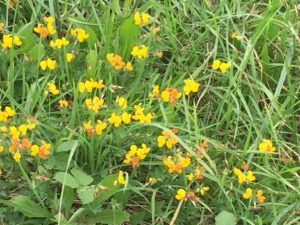 I grinned back. Picking up Saint Thomas in both hands, I envisioned Max and I wearing top hat and tails, dancing with canes. This was it – our big musical number. With a nod, and one of Svend’s winks, I began singing along to the cadence, “bomp-bomp-bomp, BAH-dah,” and started dancing down the hill, first to the left, then right, then left again, angling jauntily down the steep inclines, laughing with Max. Feeling no pain. Not the coach’s “no pain, no gain” of my own teenage experience – NO pain. Just fun. Only a delighted, exhausted joyfulness.
I grinned back. Picking up Saint Thomas in both hands, I envisioned Max and I wearing top hat and tails, dancing with canes. This was it – our big musical number. With a nod, and one of Svend’s winks, I began singing along to the cadence, “bomp-bomp-bomp, BAH-dah,” and started dancing down the hill, first to the left, then right, then left again, angling jauntily down the steep inclines, laughing with Max. Feeling no pain. Not the coach’s “no pain, no gain” of my own teenage experience – NO pain. Just fun. Only a delighted, exhausted joyfulness.
I understood that my three treks astray on the Camino represented something significant. I decided they were more Camino magic, three hikes to let me learn one lesson, about: Marriage. Dancing and singing down those kilometers, I knew I had tried to walk paths that were not my Way, that were defined for me by limitation and the expectations of others, trying to fit in, to prove something to other people.
I had tried to prove that, despite my rocky early years, I was fine – the ultimate fine, I was girl-next-door-ordinary, some definition of normalcy that safely but firmly defied my early branding of “gifted” and “brilliant” and “extraordinary,” and numbingly belied the obvious signs of artistic and spiritual seeking and a call to walk a little wild and a little stupid at times. And because, deep down, I didn’t actually, truly believe that I was fine the way I was, I had chosen marriage as a sign of social acceptability, a golden band of respectability. I had done this three times. And three times, I had completely lost myself, until I decided to leave that path and get back on track. To me. To walking my own Way. To thine own weird, wonderful self be true.
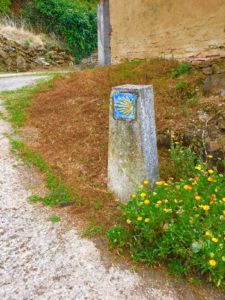 Yet my scrambles, over bewildering hills I did not mean to climb, had led me to my children. And these were people to whom I most definitely had nothing to prove. They had seen me in some of my most idiotic moments, and still loved and respected me. I liked to think that, because I took the time to explain my miscalculations to them, they felt a generosity toward their wildly improvising parent, while also learning that it was okay to make mistakes. But maybe they were just kinder than me. Or smarter. Or just healthier. They were people who seemed to take the high road naturally.
Yet my scrambles, over bewildering hills I did not mean to climb, had led me to my children. And these were people to whom I most definitely had nothing to prove. They had seen me in some of my most idiotic moments, and still loved and respected me. I liked to think that, because I took the time to explain my miscalculations to them, they felt a generosity toward their wildly improvising parent, while also learning that it was okay to make mistakes. But maybe they were just kinder than me. Or smarter. Or just healthier. They were people who seemed to take the high road naturally.
Only Max knew how to dance down the hills in joy, however. He knew already that, despite how much he might want to fit in, to respectable society, to new schools and new peer groups, no matter how hard he tried, he could not control Life. So he did his best, seeking structure and proven, clearly marked trails, measuring himself and his progress toward his goals; yet, surprisingly true to himself, he also allowed his love of improvisation, feeling his way. And a little child shall lead them, by bebop, funk, or the blues, sometimes playing his heart out, sometimes marching to his own cadenced drummer, one we could not always hear.
After that, if my legs even began to twinge, I did a little song-and-dance number, which shifted my weight and the pressures on my bones and tendons, easing the strain. I pushed myself up the hills, feeling strong, the way I loved to hike, but now, looking down from the tops of green mountains over a sea of flowers, I remembered how I had played on the beaches. My legs never gave me any more trouble, though I still had over 500 km to go to reach Santiago, Muxia and Finisterre.
But first, I had many high roads to take, over many, many hills. Time to follow the butterflies, over fences of my own making.
Improvisation is the ability to create something very spiritual, something of one’s own….It’s all about creation and surprise. It just needs to be appreciated and watered like flowers. You have to water flowers. These peaks will come again.
— Sonny Rollins, jazz sax legend
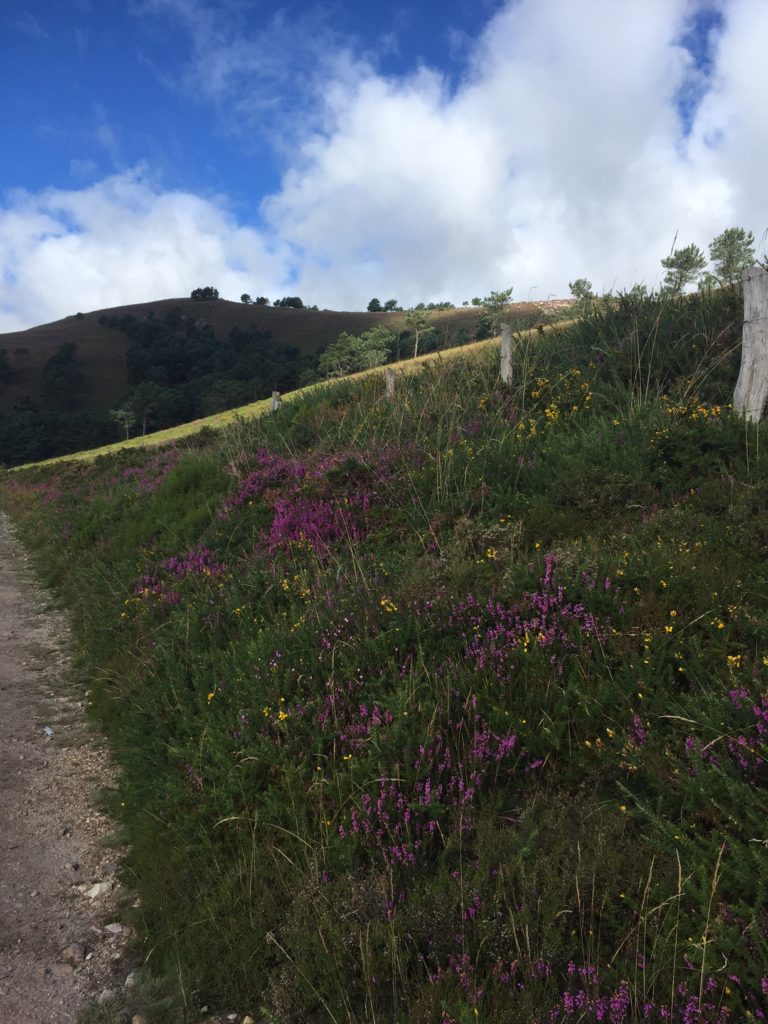
December 5, 2017 / wanderinglightning / 0 Comments
I like this farmer
tall and thin
like my own
grandfather
he has stopped
to tend his cows
my grandfather
had cows
before
I existed
cows in
our family
with names
and bells
for him to find
them I will
hang bells
for him
to find
me
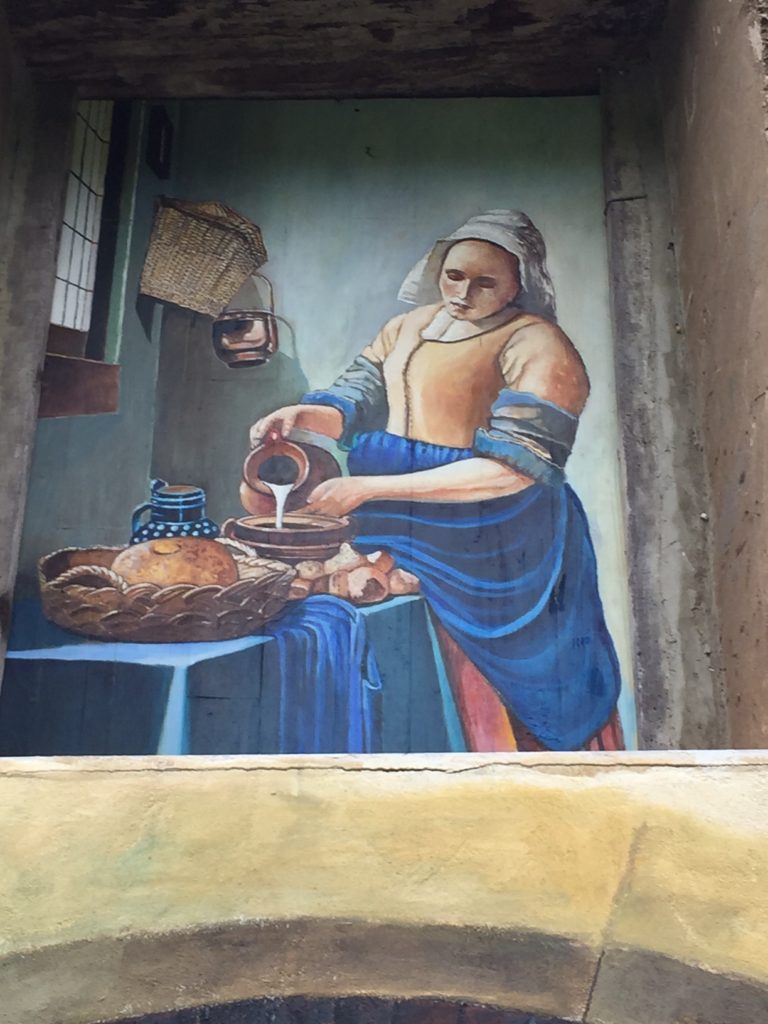
painting in a boarded up window along the Camino Norte
So much happens in a day. I never remembered it all. Sometimes, I forgot to note small moments.
Like the morning I went to find coffee at the tiny tea shop. Walking down from the hills into town,
I took a back street past the market. On a tall, dark, wooden gate surrounding a walled courtyard,
I saw an artfully lettered sign. One narrow door of the gate stood open. Carefully fitting myself and my pack through this gateway, I stepped in and stopped, looking all around me. Small trees stood among waxy-leaved bushes, flowers blushed from soft shadows, creeping vines racing to cover everything in between. Old bricks and iron patio tables and chairs formed stair-stepped seating within the garden. I left my pack and stick and entered the glass doors to the shop.
Inside, all was immaculate, white, pristine. I could already smell my daily eau de parfum, “Essence of Backpacker,” and suddenly felt particularly grungy, my boots dropping trail dirt on the white tile floor. As the frowning woman came to the counter to take my order, I realized the tea shop was connected to the back of a gracious hotel on the main street. I looked around me and saw the well-dressed guests at their tables, taking inconspicuous bites of croissant with small forks. Apologetically ordering a coffee, I made a hasty retreat back outside.
Sitting alone in the garden, sipping from my white cup, I studied the tree above me. Here, behind walls, a lemon tree. I had never seen one before. Across the path, I watched the only other soul in the courtyard, a tame rabbit, slowly hopping from its food bowl back to its small hutch.
It wasn’t claustrophobia I felt, but its cousin, Limitation, who had married Expectations. Far too keen my sympathy for the rabbit in the courtyard garden, safe, fed, sheltered. Tamed. Lonely. I felt it from the people inside, as well. Hoisting my backpack, clicking my buckles, I looked back through the glass at the hotel guests, genteel and serene. Lucky to need to stay outside, stinky sweaty peregrina.
* * * * * * * * * * * * * * * * *
At lunchtime, I stopped at a sidewalk bench as I entered another town. I carried canned paté, light in aluminum, yet packed with protein and calories; I scooped it out with my spork onto torn bread, watching workmen emptying the trash cans at the park across the road.
Each week or so, I sent postcards home, sharing small moments. I sat on the bench and finished writing this week’s thoughts, then tucked the postcards back into the top of my pack. I refilled one of my water bottles at the peregrino fountain, then set off to find the post office.
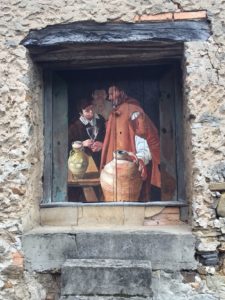 After several minutes, I realized I might have missed el correo. Stopping in a taverna, I struggled to catch the chauvinistic barman’s attention, who was deep in uninterruptible sports conversation, being ignored barside a common occurrence for un peregrina sola.
After several minutes, I realized I might have missed el correo. Stopping in a taverna, I struggled to catch the chauvinistic barman’s attention, who was deep in uninterruptible sports conversation, being ignored barside a common occurrence for un peregrina sola.
I turned to the transgender woman sitting at the end of the bar, and she patiently gave me slow directions, explaining that the post office was around the next corner and up the street. I had just enough Spanish words to say, “Thank you very much – and the yellow shirt is beautiful on you.” She smiled delightedly, and I got an enthusiastic wave goodbye.
The postal workers were unfailingly kind, all across Spain, helping me to buy my postcard stamps and always wishing me “Buen Camino!” as I struggled out the door in my pack.
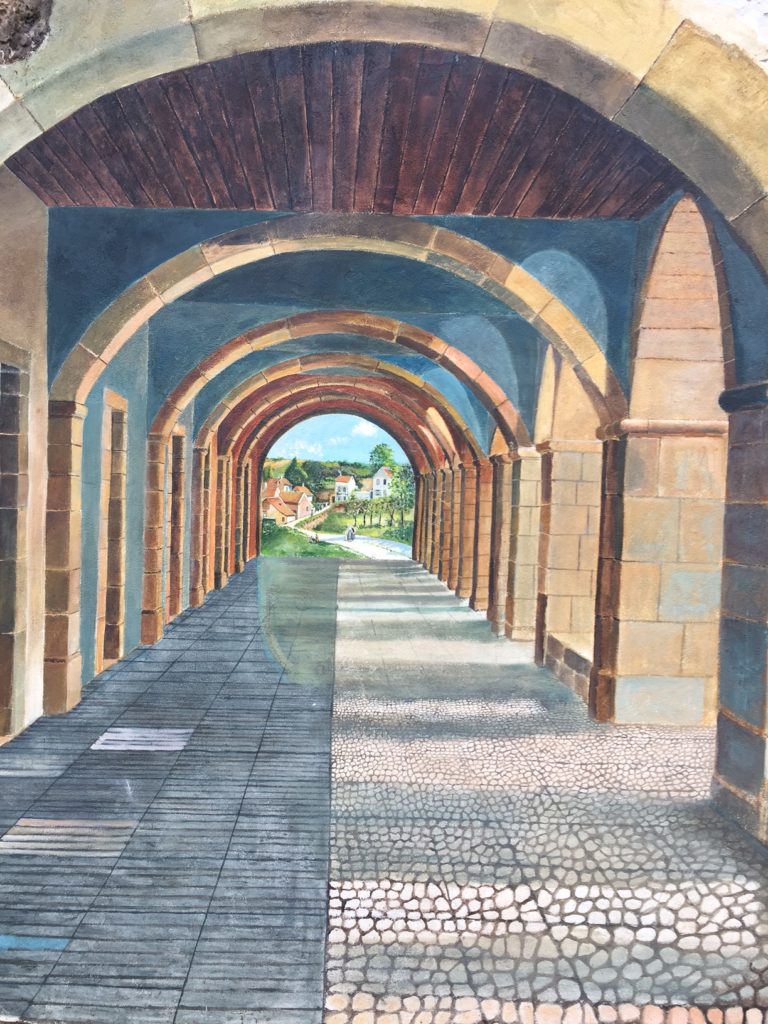
wall mural along the Camino Norte
I stepped in and out of experiences like stepping in and out of these doorways, one intention in mind, a slightly different conclusion usually following me out the door, food for thought on every bench and bubbling out of every roadside fountain. As people went about their ordinary lives, I was being given an extraordinary glimpse within, and paradoxically, this closeness felt expansive.
I waved to farmers on tractors in their fields, and they waved back. Yesterday, a farmer backed his blue tractor out of his farm driveway into the road. Then, at his command, his small dog came running and hopped up the steps into the tractor cab with him, and they set off down the road together.
I saw babies whose mothers smiled. I saw old men who did not. I saw old men who did. I saw an old woman praying her rosary just inside the doorway of an ancient church, its heavy Romanesque arches over the doorways depicting pagan images at the tops of the columns, while inside, Jesus still got crucified, classical music softly playing from hidden speakers.
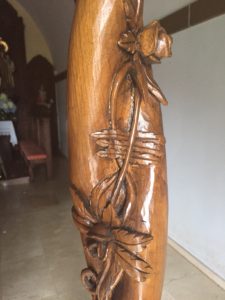 So many cowbells on so many cows; all the countryside sounded like church bells, which also rang out throughout the day. I got to go inside a tiny chapel to San Antonín because a workman was there to patch some plaster, and he waved me in with a quick hand and a nonchalant shrug. The wooden posts were carved with intricate roses, even the stems and leaves. Older geometric symbols adorned the choir loft.
So many cowbells on so many cows; all the countryside sounded like church bells, which also rang out throughout the day. I got to go inside a tiny chapel to San Antonín because a workman was there to patch some plaster, and he waved me in with a quick hand and a nonchalant shrug. The wooden posts were carved with intricate roses, even the stems and leaves. Older geometric symbols adorned the choir loft.
Last night, a grand total of five of us stayed at the albergue in Sebrayo. The hospitalero had left fresh lemons and two hardboiled eggs in the kitchen. I thought about the tea shop garden as I toasted my bread on the stove, sliced an egg onto it, and had a breakfast sandwich as I looked at my guidebook.
This was my last albergue on the Camino Norte. I squeezed lemon into my water, inhaling the fresh scent.
* * * * * * * * * * * * * * * * *
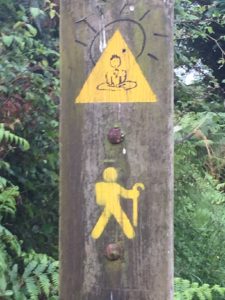 The rich enigma of going deeper within while going without, living outside, living outside the constraints of home and job and roles and expectations, had become a beautiful Gordian knot, loosening and expanding day by day, but always maintaining connection, always flowing. I had no desire to cut the knot, to conquer it by force like Alexander the Great. I only hoped to trace it, to see it for what it was. I just wanted to walk its path.
The rich enigma of going deeper within while going without, living outside, living outside the constraints of home and job and roles and expectations, had become a beautiful Gordian knot, loosening and expanding day by day, but always maintaining connection, always flowing. I had no desire to cut the knot, to conquer it by force like Alexander the Great. I only hoped to trace it, to see it for what it was. I just wanted to walk its path.
At last, here I was, the chapel at the fork in the road where the Camino Norte and the Camino Primitivo split. I stepped inside. So small, this space to contemplate our choices. I sat on a bench in the cool quiet, sipped some water, clearing my mind in the filtered light. I felt ready.
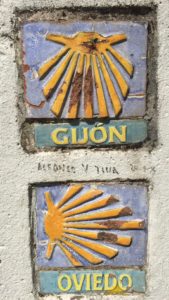 Stepping outside, I met the local woman who stocks a basket of snacks beside the chapel, next to the bench holding a sello stamp tied to a guest register book. She asked if I had water, and I showed her, and bought a plum for a few cents, so she was happy. And so was I.
Stepping outside, I met the local woman who stocks a basket of snacks beside the chapel, next to the bench holding a sello stamp tied to a guest register book. She asked if I had water, and I showed her, and bought a plum for a few cents, so she was happy. And so was I.
In the book, I wrote, “Each her own Camino.” I hiked on, the plum sweet and juicy, as the road led upward, into the high hills. I had stepped onto – into – the Primitivo.
December 4, 2017 / wanderinglightning / 0 Comments
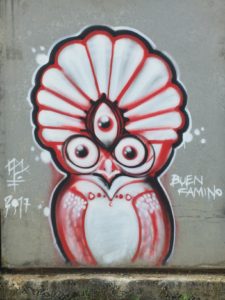
Both the owl and the Third Eye are symbols of wisdom. The Camino scallop shell is here a turban like those worn by Sikh gurus, teachers of enlightenment. “Only that life is good in which the inner battle is fought with determination, through patience and wisdom.” (Tenth Guru Gobind Singh)
“The Camino – it is therapy. I go deeper.
I become animal, natural.
I have gone beyond the seasons.”
— Antonia, Cicilian, living in Marseilles
“It’s beautiful to experience the struggle.”
— Jana, 18yo, student from Amsterdam
“All our culture is from this story.”
— Joanna, teacher, Krakow, Poland
“Every year, more people are walking the Camino.
I think that means something.”
— Fred, approx. 30yo, librarian from Versaille
“I will not let you go unless you bless me.”
— Jacob wrestling with his angel, Genesis 32:26
November 30, 2017 / wanderinglightning / 0 Comments
Gorma walked midmorning on a path along the beach, wandering among the great rocks that catch the strength of the strong waves and set the water down gently into small, shallow pools, tidal pools, which, being warm and gentle, nourish new life for all those who live where the sea meets the shore.
The tidal pools are not the deep purple-blue of the deepest part of the sea. No, they are cerulian blue, and turquoise, sapphire and aquamarine, ever-changing blues and greens like the colors of a peacock’s tail. Tiny sea creatures live here, a miniature world within a rock basin, protected and safe from the wild and wondrous waves ever heaving.
As Gorma carefully picked her way between the great rocks. she came upon a sea-woman, those creatures who resemble women of the land, but have the sea always in their eyes – you can see it there, if you look close, and quickly. She was sitting on the edge of one of the tidal pools, leaning out to speak to some young seals, who had gathered between the great rocks and the pools.
“Ah, Gorma, Gorma, how happy we are to see you! Class dismissed!” And with that, the young seals dunked their heads under the water – boop! boop! boop! boop! boop! – and were seen next far down the beach, frolicking in the waves.
“What class is this, if I may ask? For, what can you teach the seals?” Gorma asked in happy wonder.
“It’s dance, of course, as all young seals must be taught the joy and grace of moving with the sea. Would you like a lesson?”
“Oh yes, please, a lesson,” Gorma nodded eagerly, and set Saint Thomas, her walking stick, in a safe place out of the water, and there he watched over her bag. She tossed her cloak upon the rocks and stood on the beach, where the surf just tickled her toes.
The teacher was Aqua. Her mother had been a dancer and a sea-woman, too. Aqua had been born into a tidal pool, nourished with the tiny creatures born to the warm and quiet places within the sea. For Aqua was actually a dancing starfish, given the form of a sea-woman by her mother so that she might come and go her way as she pleased.
“A little deeper, Gorma,” Aqua instructed. The water lapped at Gorma’s ankles. “Keep going,” Aqua coached, smiling.
“Farther.” The water brushed Gorma’s knees. “Farther.” The water belted Gorma around the waist. “A little…farther.” The water came under Gorma’s arms, and around her chest.
As a wave broke around the great rocks, it gently lifted Gorma as if she were in the arms of a graceful dancer, then set her down again lightly. Gorma laughed with delight, looking astonished at Aqua.
“Well done!” Aqua called, laughing in return. “One more time! Dance with the sea.” So Gorma stepped in until the water came up under her arms and around her chest, and over and over, Gorma and the sea danced. Soon Gorma was springing to the right, and swinging to the left, and always the sea would catch her gently and set her down lightly.
Gorma danced with the sea until it was midday, the sun was hot, and Gorma was hungry from all her fun. She shared a lunch with Aqua of seaweed crisps and apple slices and delicious cold water with lemon, sparkling in the sun.
“Now Gorma, Gorma, you must stay and watch my students give you a dance recital. Children, it is time for class!”
And – boop! boop! boop! boop! boop! – the little seals returned, all eyes on Aqua, their little whiskers twitching with anticipation. “Children, let us show Gorma what you have learned, shall we?” And as Aqua smiled, a music could be heard, of seagulls and terns, of breezes through the grasses on the sand dunes, of water upon rock, and the strange and beautiful voices of whales, somewhere far off in the mysterious deep.
The seals formed a circle and took turns diving into the center. Their flippers tipped and their noses touched. The twirled ’round each other, smoothly gliding fur on fur for an instant, and then free. Then all together, they swam far out into the waves and back again, as if they had become a wave themselves. Returning to Aqua, she kissed each upon the head, and – boop! boop! boop! boop! boop! – they turned for home.
“Wonderful! Just wonderful!” Gorma clapped and smiled. The seal pups barked their goodbyes.
“Aqua, what might you need for this wonderful school?”
“More students, Gorma, always more students. For all children can be taught to dance with the sea, and with each other. It is the gentleness of touch that lets us dance with all our hearts. And that is why the seals are such good students.”
So Gorma promised to send more students, and she thought of a few children at home, little sea monkeys who might like the dance with the seal pups in the gentle waves. Gorma picked up her bag and her cloak, and waving goodbye, she took up Saint Thomas and walked on, quiet and smiing. She arrived at the next albergue just in time for a bed, for which she was very grateful, and she slept deeply. Outside, the seal pups slipped in and out of the gentle surf, and the great rocks kept them safe from the wild and wondrous waves.
Buen Camino, Aqua.
November 30, 2017 / wanderinglightning / 0 Comments
I found La Virgen
made of sand
and coursing tears
never ceasing
outpouring love
her robes
flow to the sea
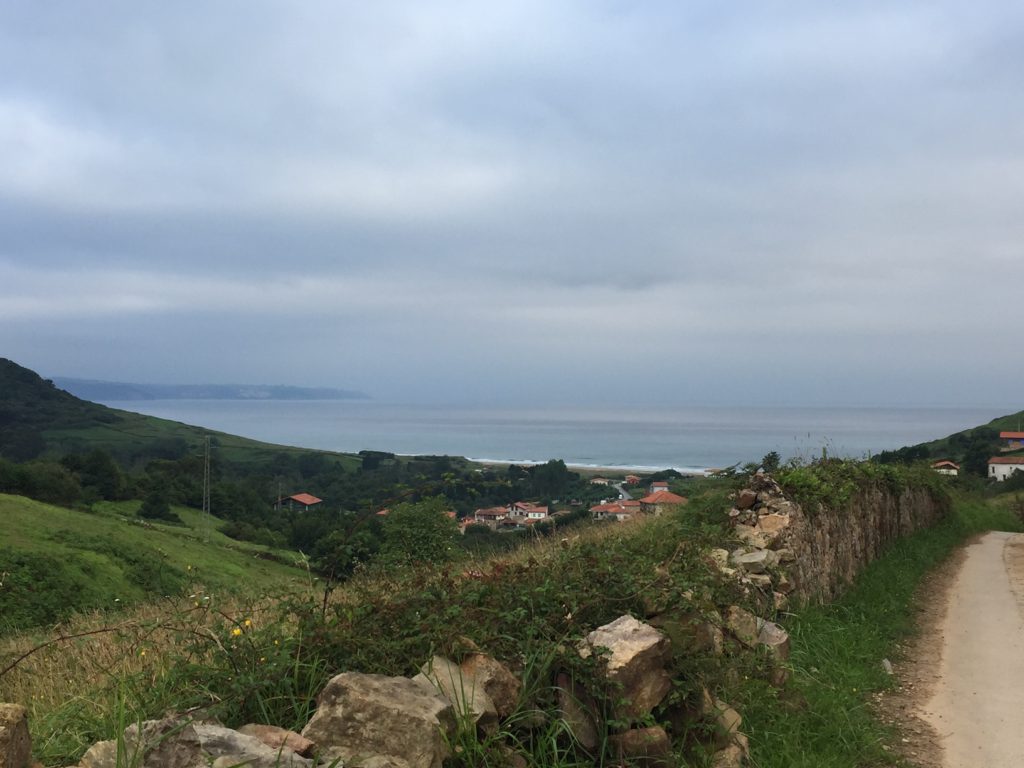
Last of the beaches. Tomorrow I will come to the fork in the road – Norte or Primitivo. The Primitivo cuts cross-country, inland, through the mountains. It is the oldest stretch of the Camino, and daunting, from the stories I have been hearing. A test of endurance.
I hadn’t realized I would feel heartbroken, leaving the sea. In the morning, I stepped onto my first beach under heavy skies, meandering between the grassy dunes and surf. I found sea glass and a piece of shell. And then, wandering toward the far end of the beach, I came upon a miracle.
How shall my heart be unsealed unless it be broken?
— Kahlil Gibran, “Sand and Foam”
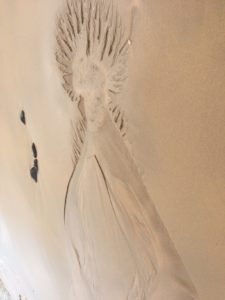 There she was. My Own Virgen. She Who Hears…Me. Alone on an empty beach, my eyes could not look away from this apparition of the Goddess of Mercy made of the sand and sea. Water bubbled up from unseen creatures or unseen pools, rising through the sand, creating a halo of flowing hair and robes like a current of love bringing Her to life in front of me. I felt my heart rise as well, singing a song I could not yet hear, breaking open like a wild wave over dark, volcanic rocks.
There she was. My Own Virgen. She Who Hears…Me. Alone on an empty beach, my eyes could not look away from this apparition of the Goddess of Mercy made of the sand and sea. Water bubbled up from unseen creatures or unseen pools, rising through the sand, creating a halo of flowing hair and robes like a current of love bringing Her to life in front of me. I felt my heart rise as well, singing a song I could not yet hear, breaking open like a wild wave over dark, volcanic rocks.
We choose our joys and our sorrows long before we experience them.
— Kahlil Gibran, “Sand and Foam”
I had no scientific explanation for the coincidental alignment of all the bubbles and all the tiny rivulets creating this work of living art. Synchronicity, that I was the one who came upon such a sand painting as it was happening, finding meaning in the random. Sitting on a rock near Her, flowing with the long, slow tides rolling before me, I wrote poetry, in gratitude.
* * * * * * * * * * * * * * * * *
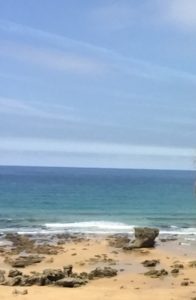 A beachside cafe opened, so I had coffee in bare feet. Brushing the sand off, boots on, I hiked to the next beach. This time, I swam, in big, strong waves like galloping horses, waves to take seriously. I watched new surfers learning the read these waves, skinny young high school kids nervous to go too far from shore.
A beachside cafe opened, so I had coffee in bare feet. Brushing the sand off, boots on, I hiked to the next beach. This time, I swam, in big, strong waves like galloping horses, waves to take seriously. I watched new surfers learning the read these waves, skinny young high school kids nervous to go too far from shore.
A big red-bearded man appeared. Striding across the beach in his wetsuit with the relaxed, confident manner of experience, he and his board entered the water without a sound or a ripple. I watched him paddle out beyond the youngsters, then in one easy motion, stand up and surf effortlessly, gracefully, back in over the roaring waves.
Great beauty captures me, but a beauty still greater frees me even from itself.
— Kahlil Gibran, “Sand and Foam”
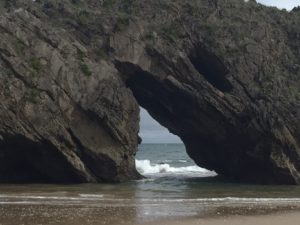 He reminded me of my oldest son, Zachariah, a big red-bearded man of the mountains. Yet Zach moved with the same relaxed confidence, graceful and athletic. I smiled at the bearded surfer from far across the beach.
He reminded me of my oldest son, Zachariah, a big red-bearded man of the mountains. Yet Zach moved with the same relaxed confidence, graceful and athletic. I smiled at the bearded surfer from far across the beach.
Everywhere I had walked in Spain, I had seen little ones with blond curls, memories of little Zach drifting after them down sidewalks and beach promenades. My first child; how to explain to your first child what they mean to you, how they changed you just by their appearance in the world.
It was but yesterday I thought myself a fragment quivering without rhythm in the sphere of life. Now I know that I am the sphere, and all life in rhythmic fragments moves within me.
— Kahlil Gibran, “Sand and Foam”
Zach was born mellow. A spiritual seeker by nature, he became a deep thinker by habit, not content to only understand why things worked the way they did in life, but always asking why they couldn’t work differently. Better.
It’s not easy being soulful in a binary world of right/wrong answers. Impatient with ordinary limitations, Zach pushed himself to grow, often in unorthodox ways, always searching for meaning. It was here that our paths aligned, and collided.
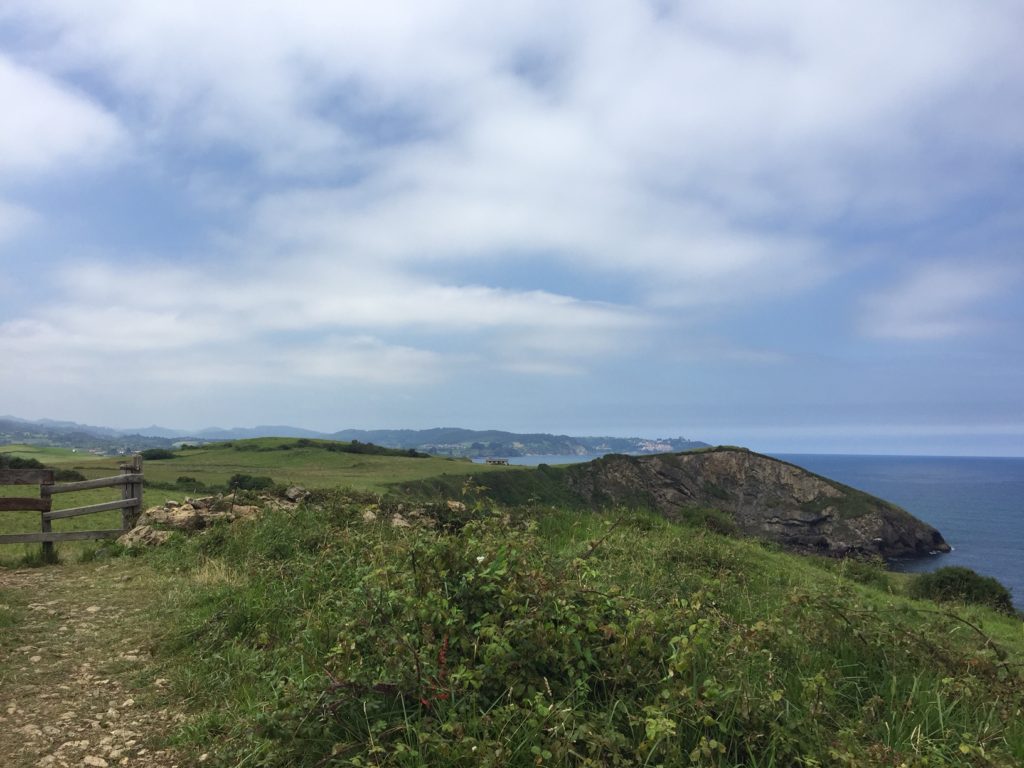
The song that lies silent in the heart of a mother sings upon the lips of her child.
— Kahlil Gibran, “Sand and Foam”
I was such a young mother. Pregnant at 19, I didn’t know what I was doing. I didn’t listen well to what he was trying to tell me. I didn’t know to let Zach lead his own path of discovery, and just come along with him to avert disaster. Disaster was the only path I knew. So I blocked him at
every turn.
Zach wasn’t going to fight about it – not about anything. But he wasn’t going to take the status quo for an answer about anything, either. It wasn’t that he was belligerent: he was just not wired for mindless conformity. He simply refused to stop questioning perceived limits.
I later found out the term for this behavior: experiential learning. Experiential learners make great experimental theorists, eager to test their hypotheses by testing themselves. They hurl themselves against arbitrary boundaries and sail over the edge of the known world, bound for discovery. These are the brilliant fools for understanding who rush in where angels fear to tread. Explorers.
A traveler am I and a navigator, and every day I discover a new region within my soul.
— Kahlil Gibran, “Sand and Foam”
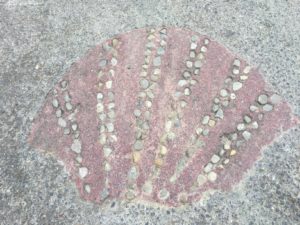 All along the Camino, I found Zach exploring paths in front of me. His energy was my energy, but better – less burdened, lighter, more free. Where I had to break the wave of my heart upon the rocks, Zach was the experienced surfer, gliding over these troubled waters, fearless to be tested. Showing teenage me how it’s done.
All along the Camino, I found Zach exploring paths in front of me. His energy was my energy, but better – less burdened, lighter, more free. Where I had to break the wave of my heart upon the rocks, Zach was the experienced surfer, gliding over these troubled waters, fearless to be tested. Showing teenage me how it’s done.
For 30 years, I had forgotten to thank him. For the surfing lessons. For appearing in the world. To Me.
When I was pregnant with Zach, I studied books about the progress of his development, noting week by week what new milestone he had reached – fully formed spinal cord, heartbeat, fingers and toes. I read about the process of labor and delivery, stages, centimeters of dilation, the thinning of effacement, how the baby moves down and heads out into the world on his own.
Yet, when the time came, it was not in stages – it was all in waves. My water broke in a steady stream, and as we left for the hospital, this inland sea continued to flood. As the contractions became stronger and steadier, I found the best way to manage them was to ride them – I surfed over the crests of the contractions. Sometimes, I was inside the wave, bent low but somehow still on my feet, seeing all the world a watery turquoise of filtered light. I surfed those waves until we both made it to shore, drenched and totally alive.
As I watched his bearded double smoothly cruise all the way in to the beach, I heard the tune of the first song I would write on the Camino. The first of many.
When Life does not find a singer to sing her heart she produces a philosopher to speak her mind.
— Kahlil Gibran, “Sand and Foam”
Brushing the sand off, boots on, I hiked to the next beach. Listening. Humming.
* * * * * * * * * * * * * * * * *
Heard El Bufones before I had fully come upon them. Here, waves break inside cracks and caves in the cliffs. The sound is incredible: low, like a great drum, like the waves are breaking within a mountain cirque under black storm clouds and you are inside it as well, within the sound.
I was actually standing above, overtop the crevices, listening to the earth and sea make this deep music. But it doesn’t matter where you stand – it pulls you, like gravity; the world contracts around you, close and listening. At high tides, the cliffs will spout water like whales, the earth breathing as it swims through its oceans.
* * * * * * * * * * * * * * * * *
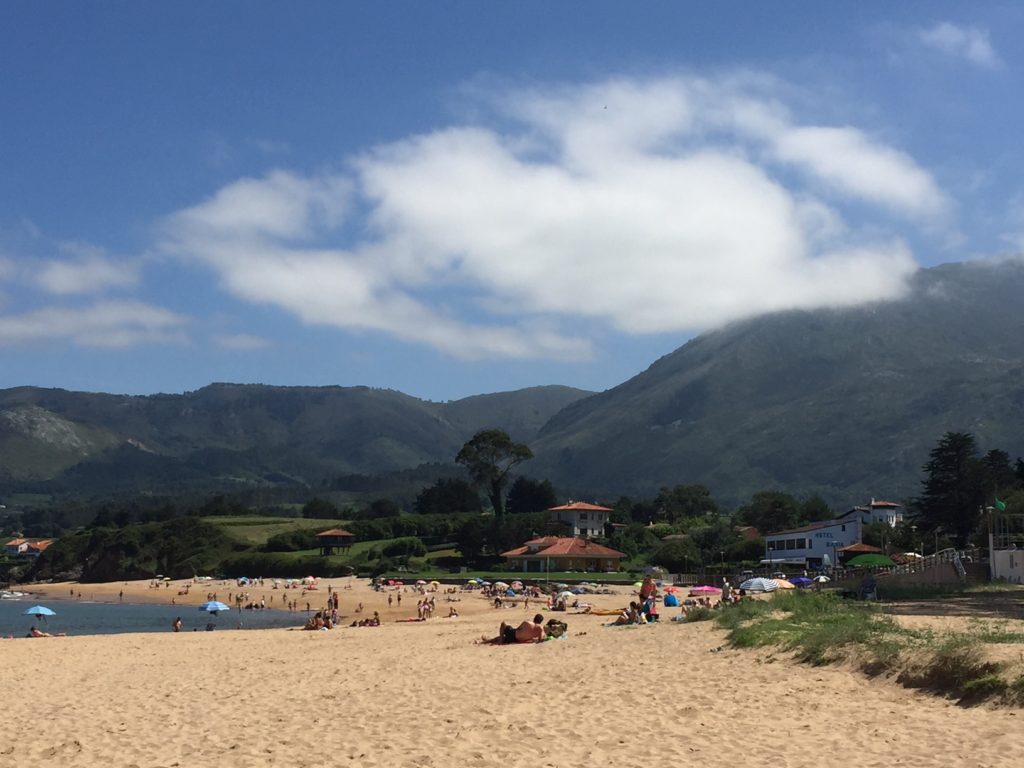
At the last beach, the waves were almost nonexistent, just rising and falling water. Mellow. Nothing to body surf, nothing to worry about. Cooled from the hot sun, rinsed off and relaxed,
I got to lay on the beach one last time, watching all the people walking, wading, playing beach badminton; hearing calls for children to come eat, the triumph and glee of missed racquet hits, the seagulls crying and turning along the shore. Finally, I just lay looking at the clouds changing overhead.
I am forever walking upon these shores, betwixt the sand and the foam.
— Kahlil Gibran, “Sand and Foam”
I learned the differences in waves today. The trepidation I felt about the Primitivo had become a readiness to rise above. My poem, about the shell I found on the beach of the miracle, became the song I was hearing. Hearing, and being heard, the song no longer silent.
that water will make foam
still a mystery to me
the placement of these pebbles
on the sand
so ordered and so free
how each one shines
from where it’s been
beneath the waves unending
November 29, 2017 / wanderinglightning / 0 Comments
One evening, Gorma walked through a seaside town, where the stone of the road is softened with moss along the cracks between, where ivy falls like mermaid’s hair over every wall, and the houses and shops are built tall and slim, one upon the next, some of tile, some painted bright colors, and each wall leading to something new around every corner. And so many corners there were! For each road led to several streets winding from it, some slowly moving uphill like chimney smoke, some rolling away downhill like ribbon and wrappings from a gift. As she wound her way through the twisting streets, Gorma became quite lost, a great happiness to Gorma, for this is when adventure begins.
Sure enough, just past a tall building with iron balconies like woven branches of flowers, near the tiled clock tower, a warm light shown out into the tiny street. Along with the salty-sand smell of the sea, Gorma now sniffed an aroma of rich, delicious food, and a burst of happy laughter drew her in to a small taverna with tables spread about, and chairs at each for friends to gather, as they had throughout. Plates of food, plenty to drink, and smiling good cheer filled each table save one, and so here, Gorma sat.
She had no more than removed her bag and cloak and set Saint Thomas, her walking stick, to stand in the corner, when the waiter appeared. “Oh, Gorma, Gorma, at last you have arrived,” he smiled warmly. “You shall have the Pilgrim’s Menu, such food as the weary traveler needs. Have no cares now.” His name was Gaspan, and quick as you can clap your hands, he was back with wine and bread.
Gorma broke a piece of bread, and it was strong on the outside, soft and sustaining on the inside. She tasted it, and immediately, she could smell the bread baking so many years ago in her own grandmother’s kitchen, and hear her grandmother calling to her for warm bread, warm bread, little one. This bread was like a comforting embrace in the folds of grandmother’s skirts, and as Gorma ate it, she sighed happily.
Next, she tasted the wine. Suddenly, her father’s grapevines in the sun lay before her, and she could see him scolding away the birds and laughing at the cat, who could never catch them. This wine was like renewal in the sun, seasons coming full with fruit and seasons for resting, and so for new growth as the sun returns again.
Gorma had just set down her glass, looking at the rich reds and purples of the wine, when Gaspan brought a plate of scrambled egg omelette filled with asparagus. “So good for you, Gorma; you will love this,” he told her with a happy nod. He refilled Gorma’s bread basket, then turned and was instantly back in the kitchen. Gorma took up her fork, and put the lovely soft yellow and green omelette into her mouth. And now she felt her grandfather’s hands on her own, teaching her how to use the pitchfork to loosen the mulch and soil over the asparagus patch, his hands baked brown and strong like bread from his years of farming in the sun. He spoke in the old language as together they worked the patch, fork by fork, until Gorma had finished eating her eggs and asparagus.
At once, Gaspan served steak and potatoes, and as she took her first bite, Gorma smelled her mother cooking many years ago, and heard her brothers and sisters crowding the table, all knees and elbows pushing and reaching and laughing at each other, and each laughing back. Gorma elbowed too, and laughed at them all, until they all ran off to chores or play, and her plate was finished.
Gaspan returned at that exact moment, carrying a dish of ice cream, with berries and fruit on top. As Gorma put a spoonful of the ice cream on her tongue, she was with her own young children again, though they are grown now. They were all singing, “Happy Birthday to you, Happy Birthday to you…,” and with a taste of each fruit, it was a different child’s birthday, and so she saw each one, from first to twenty, with cake and ice cream and a gift, over and over, until the spoon lay empty in the cup.
At this, Gaspan brought coffee, dark and heavy and rich, solid like the mountains where it grows. Into this he poured thick cream, smooth as the long, slow waves of the calm sea outside. As Gorma sipped her coffee, she remembered every dream she’d ever had, dreams of love, and family, and always, the dream to see the world. For as food nourishes the body, so love and family should nourish the dreams we carry in our hearts.
Full and content, Gorma left Gaspan the coins for her meal, and a shell of the sea beside them. She gathered up her bag, and her cloak, and Saint Thomas, and walked out into the early night, quiet and smiling. The tiled clock tower showed the same hour as when she had entered the taverna, and so, there was still plenty of time, to walk in the world.
Gorma arrived at the next albergue just in time for a bed, for which she was very grateful, and she slept deeply. Outside, families waked home from the seaside, laughing and happy, along the mossy stone roads, home to their own small houses, where they kissed each other good night.
Buen Camino, Gaspan.
November 29, 2017 / wanderinglightning / 0 Comments
the tolling of the bells
high to low
high to low
as I look across
green hills
sheep in pastures
houses in the valley
sweet with fruit trees
the wooly white of plaster
red tile roofs like apples
dropped on long stone walls
high to low
high to low
as I look across
great mountains
looming from mists
towering into cloud and time
paths I cannot quite see
but want to find
a space to breathe
in hillside rain
high to low
high to low
the tolling of the bells
as I look across
As I left Piñeres and the stunning view of misty mountains, I came upon the painted stones.
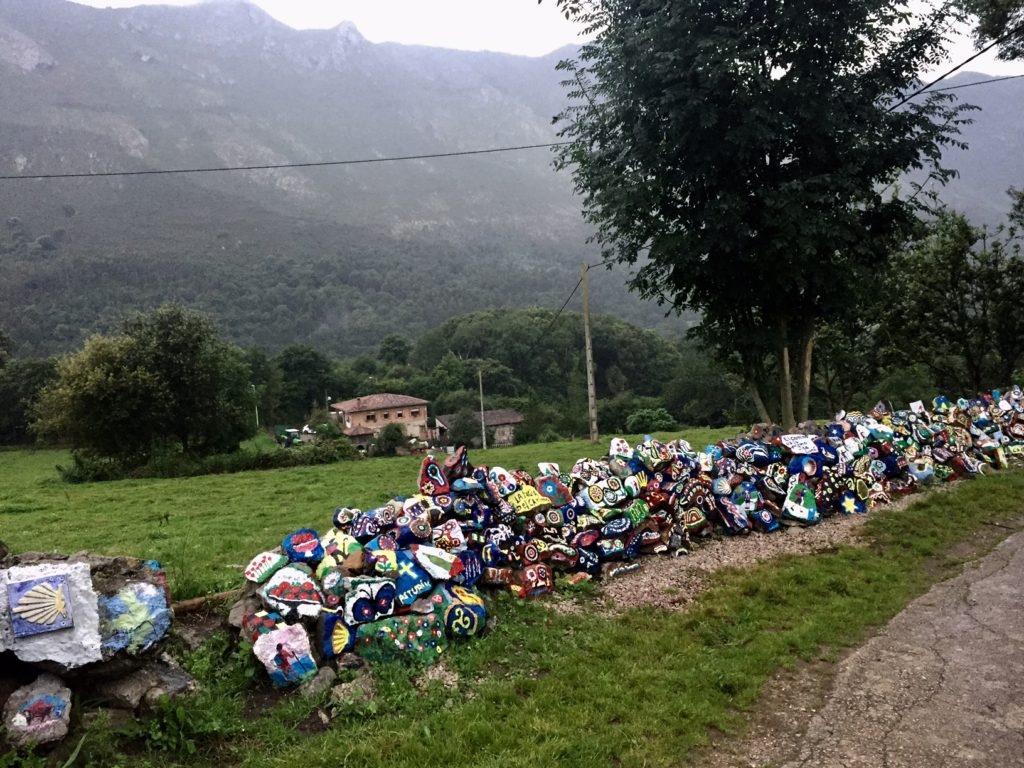 What a wonder. I suspected they were painted by the same artist whose folk images were framed on every floor of the rectory, my favorite a group of chickens, reminding me of the Chicken Fiesta.
What a wonder. I suspected they were painted by the same artist whose folk images were framed on every floor of the rectory, my favorite a group of chickens, reminding me of the Chicken Fiesta.
These rocks were painted with images and symbols of Astorias and the Camino, phrases like “Camino Magic” sprinkled throughout. Even after the fiesta of colorful stones ended, here and there I found a star, then another, yellow, painted randomly on rocks within the stone wall along the path.
Finally, a sign: Camino de Estrellas. So I had traced the Camino of Stars, quite fitting after the rainbow arching from the rectory to the mountains yesterday evening. Following these heavenly signs, I walked into the The Feast Day of Saint James.
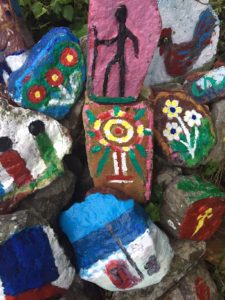
According to the stories, James was an ordinary guy, a fisherman with his brother. As Jesus was walking his path, doing his Galilee camino, and passing the place where they were fishing, he apparently worked a miracle, so that as they pulled up their nets, the nets overflowed with a catch so heavy the fish wriggled and flipped in enormous heaping mounds in their boats.
And just like that, James was hooked by Camino Magic.
He became one of Jesus’ apostles, and after Jesus’ death, he reportedly traveled to Spain, teaching and preaching the truth as he had come to believe, a truth of transformation. A gently rebellious belief in the power of one life connected to the sacred. As if it might matter. As if this sort of connection might save our lives.
Foolishly returning to the scene of these crimes of transcendence, he was of course killed; beheaded without mercy, by Herod, while in Jerusalem. Yet now, the Camino Magic picked up where Herod left off. Give it to La Virgen de la Barca or simply to James’ only known followers, Athanacio and Teodoro, somebody is believed to have retrieved his body and brought it all the way back to Spain, across the sea, burying him in an unmarked grave in an open field. Time passed: centuries.
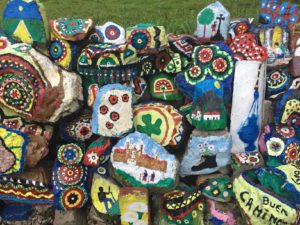 Nearly 800 years later, a hermit, a peasant, a man of no standing, an ordinary guy, had a vision. His name was Pelayo. He saw a star shining brilliantly on one spot on the campo, the grassy fields, and he believed this had a deep and powerful meaning, a connection to the sacred. As if it might matter. So he found the local bishop, and took him to the exact spot, and where the star had shone so brightly – they uncovered buried bones.
Nearly 800 years later, a hermit, a peasant, a man of no standing, an ordinary guy, had a vision. His name was Pelayo. He saw a star shining brilliantly on one spot on the campo, the grassy fields, and he believed this had a deep and powerful meaning, a connection to the sacred. As if it might matter. So he found the local bishop, and took him to the exact spot, and where the star had shone so brightly – they uncovered buried bones.
The bishop declared them the lost bones of Saint James, Santiago. He became Santiago de Compostela, Saint James of the Star Field, as did his tomb, within his chapel, which became his cathedral, within his majestic city, on his camino, which extended across all of Europe. Three major pilgrimage destinations arose for early Christians: Rome, Jerusalem, and Santiago de Compostela.
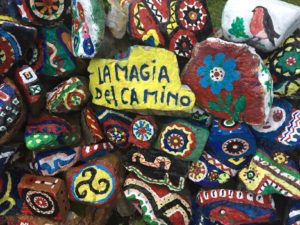 Herod’s fear and intolerance were defeated by Camino Magic. By the Camino of Stars, which led from a star shining over Jesus’ storied birth in a stable, to a star shining over James’ bones in a pasture. Nobody important, these two ordinary guys, Jesus and James.
Herod’s fear and intolerance were defeated by Camino Magic. By the Camino of Stars, which led from a star shining over Jesus’ storied birth in a stable, to a star shining over James’ bones in a pasture. Nobody important, these two ordinary guys, Jesus and James.
Nobody important, either, this guy Pelayo, whose name means, “of the sea.”
* * * * * * * * * * * * * * * * *
Walking in the light rain yesterday, I found myself turning over the puzzle of my mother like a Rubik’s cube in my hands. What to do with her, what to do. Finally, I asked out loud into the rain, “What happened to you? Where did you come from?”
I know, and yet I do not know. I hiked along, examining her story from all sides. I wondered how she felt when she was seven years old and her mother had a stroke. Did anyone explain it? She must have been very scared, and very sad, and, I would bet, very alone, from what I had seen of her family. Over the next ten years of her young life, she watched her mother slowly deteriorate, stroke upon stroke, upon stroke. Until the one that finally ended her life. When my mother was only seventeen.
Seventeen-year-old me remained quiet. I looked at them both, trying to place them side by side. But while the image of my young self was feeling stronger and more real within me each day along the Camino, this image of my young mother shimmered and rippled, blurry in the mist.
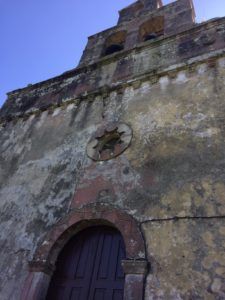 Passing a roadside shrine, I found a very young image of Mary with her Baby, like a teenager holding a child. Like my mother, who was not allowed to walk across the stage at her high school graduation, her seven-months-pregnant belly announcing that her baby would be born sooner than anyone found comfortable. She had met a very charming young man, flattering her with attention and promises. She had to be gasping for air, having just lost her mother after a decade of childhood agony, the pressures of graduation upon her, pinning her hopes on her application to the Art Institute of Chicago, where her graceful lines and deft touch could be transformed into a life of beauty.
Passing a roadside shrine, I found a very young image of Mary with her Baby, like a teenager holding a child. Like my mother, who was not allowed to walk across the stage at her high school graduation, her seven-months-pregnant belly announcing that her baby would be born sooner than anyone found comfortable. She had met a very charming young man, flattering her with attention and promises. She had to be gasping for air, having just lost her mother after a decade of childhood agony, the pressures of graduation upon her, pinning her hopes on her application to the Art Institute of Chicago, where her graceful lines and deft touch could be transformed into a life of beauty.
I wondered now if the waiting became too much; if it felt like centuries passing overhead, while your heart remained buried, unmarked. Unknown. I have never known if she was accepted to the Art Institute. I only know that she gave birth to my brother, and married the charming abuser, and struggled in menial typing jobs, night jobs, watching her earnings blown like dry leaves on alcohol and partying with drinking buddies, on make up to disguise bruises. I know she scrimped to save a few hundred dollars to hire a divorce lawyer. I know she felt a rageful triumph in serving the papers to his unsuspecting, blinking, stammering face. I know she and my brother ate dry corn flakes without milk and survived on her night jobs, with family and acquaintances babysitting.
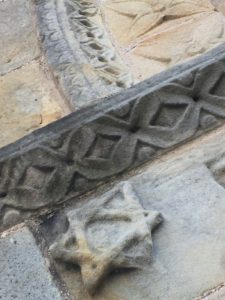 And I know when she met my father, he was married, but unhappy; handsome and charming, but safe; a man in uniform, a former Marine now in law enforcement. I know she worked for him as a secretary. I know he saw her and thought she was stunningly beautiful. I know he gave her a ride, helping her pick up her little boy after work, and I know she intentionally left the tiny rainboots in the back of his cruiser.
And I know when she met my father, he was married, but unhappy; handsome and charming, but safe; a man in uniform, a former Marine now in law enforcement. I know she worked for him as a secretary. I know he saw her and thought she was stunningly beautiful. I know he gave her a ride, helping her pick up her little boy after work, and I know she intentionally left the tiny rainboots in the back of his cruiser.
We talked before his death, years ago, my father and I. I know he saw her as his salvation, his ticket out…the same way she saw him. He lost everything when he chose her – his family, his career, respect, trust. I know this proud man was mocked for following his heart. And I know that, though he wanted to be a man of peace, he was a man of passion.
He loved her to the end, to his very last day. And I could never understand it. I hadn’t known her then. I never met that young woman. Except, I did. I just didn’t remember meeting her.
He left everything behind for her, seven months pregnant – this time, with me. I would be the only baby whose birth he remembered like a photo framed in his memory. I would be the child he asked to help him as he was dying, to preserve his dignity and pride. I was nobody; I was child #8 of 10, the child who crushed my mother’s hope to give him a son. It was the worst task he could have given me. It was the most significant and beautiful task of my life. And she was the link between us. She gave me this father, who was safe, and strong, and devoted to a woman who wielded the pain of her childhood like a sword, trying to behead a hydra she could not defeat. Beheading the child instead, armored in a scream she never voiced, this motherless child become childless mother.
Maybe it is that She Who Hears the Cries of the World cannot hear what cannot be uttered. Or maybe we cannot see our one true believer, the ordinary guy who saw us at the window and thought the light shone from within us. I think it more likely that we cannot ask for mercy, nor offer it, if we have no concept that it might exist in the world.
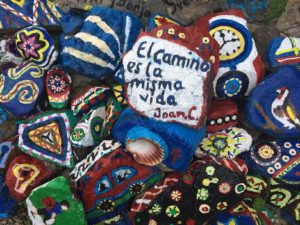 Seventeen-year-old me recited some Shakespeare from British Lit class as we made our way along the muddy path together:
Seventeen-year-old me recited some Shakespeare from British Lit class as we made our way along the muddy path together:
“The quality of mercy is not strained;
it droppeth as the gentle rain from heaven
upon the place beneath. It is twice blest;
it blesseth him that gives and him that takes….”
* * * * * * * * * * * * * * * * *
At the albergue, we were all surprised and touched when the nearby community came together and prepared mounds of food just for us, los peregrinos, for The Feast of Saint James. In the sloping backyard, on long tables pulled into the grass, arrived platters of pinxchos, serrano ham and sausages, egg and potato tortilla, baskets of bread, wine, beer, local cider, and oh, my beloved bizcocho.
I had been talking about this day for weeks – but never expecting an actual feast. I had thought I would celebrate quietly, mindfully perhaps, perhaps with others if they wished.
But the locals were having none of that. Laughing, singing, they would lift trays of food and carry them to us, urging us to eat more, drink more, handing food down to us from above, creating a community celebration as we sat in the grassy field, all together. It was like Christmas in July. Like Dios de Los Muertos in Colorado, where you picnic on the graves of those you love, with those you love. Only here, those we loved were those we did not know. Except, we did.
Surrounded and served by the kindness of strangers, we toasted each other. God rest ye merry.
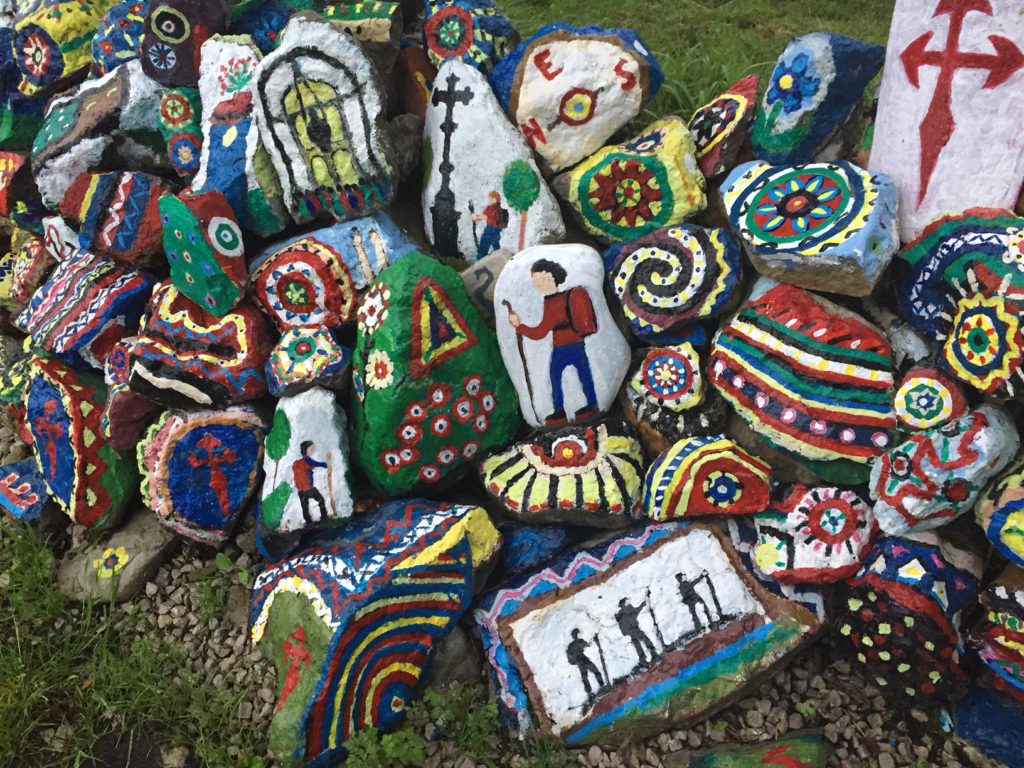
November 29, 2017 / wanderinglightning / 0 Comments
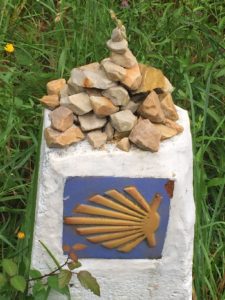
she made us
dinner of nothing
we added
little bits of nothing
sat together talking
through our daily bread
of nothing
really
such a feast
Instead of getting to Villahormes, I stopped in Celorio. An older man in Poo had recommended Celorio, and he was right: for 15 euros, I had – a private room. The luxury of opening up, spreading out. I hung my washed laundry on hangers that now felt foreign, strange in my hands. I laid out all my stuff on the bed and aired out my pack. The things that mattered included my sleeping bag, water bottles, light trail foods, socks, towel, passport, wallet, and guidebook. And I cast a dim eye on the guidebook. The rest – clothes, toiletries, metal bowl and spoon, even my duffle-turned-pack-cover – was superfluous, but added a degree of ease and comfort, each earning its keep in situations where the albergue kitchens were ransacked bare, even of dented cookware and half-melted spatulas, or in the infrequent deluges of rain. But the most precious item, the one I would carry in my arms like a baby if I had to, was my notebook.
Everybody had something, it seemed. A woman carried a ukelele, a man a guitar. A camera was precious to this person, a sketchpad and pencils to another, like Svend. Miguel wore tiny bells that chimed. One man carried an enormous, elaborately carved didgeridoo. They all added weight, or awkwardness through gates and city crowds, or issues in the rain. And they all seemed to be about creating, expressing ourselves and relating to each other and to the Camino itself. We wore our hearts on our sleeves for all to see, carrying them on our backs like millstones of freedom, each with our talisman.
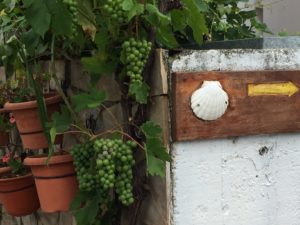 I was writing faithfully, every day, little observations, snips of poetry, descriptions of fascinating characters, obsessively counting kilometers, ignoring kilometers in favor of deeper meaning, describing my epiphanies, my food and my blisters. My notebook would be my memory, I knew, but something more: it was my roadside shrine, my daily chapel. It was my zendo, the place I sat still; it was my mosque, the place I bent low in prayer and spiritual communion.
I was writing faithfully, every day, little observations, snips of poetry, descriptions of fascinating characters, obsessively counting kilometers, ignoring kilometers in favor of deeper meaning, describing my epiphanies, my food and my blisters. My notebook would be my memory, I knew, but something more: it was my roadside shrine, my daily chapel. It was my zendo, the place I sat still; it was my mosque, the place I bent low in prayer and spiritual communion.
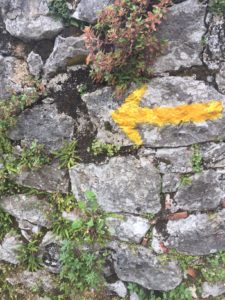
Most days after writing, I would rewrap my notebook in the plastic bag from my socks purchase, followed by the mandatory antibacterial plastic bag from the albergue that was sure every peregrino had bedbugs. I would tuck it back into my backpack, and then, every day, I left everything behind: to take a shower, to make food in the kitchen, to see the city, to head for the beach. We all did. We grabbed a handful of money and our IDs and went to live in the moment, with nothing but our selves.
* * * * * * * * * * * * * * * * *
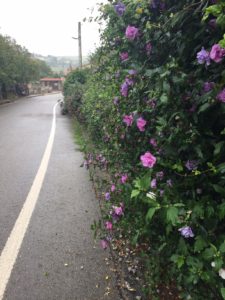 I had been thinking I should buy a swimsuit, maybe as a souvenir after Santiago. However, walking through the town of Llanes earlier, I passed a woman in a sidewalk kiosk selling handmade cotton bikinis, each one unique, because they were made from leftover fabric samples and scraps. Clever and resourceful, she was excited to take the risk, set up shop, invest in herself and her idea. One suit caught my eye, flowers and polka dots, and I bought it without even trying it on. Because I knew it would be perfect – and it was.
I had been thinking I should buy a swimsuit, maybe as a souvenir after Santiago. However, walking through the town of Llanes earlier, I passed a woman in a sidewalk kiosk selling handmade cotton bikinis, each one unique, because they were made from leftover fabric samples and scraps. Clever and resourceful, she was excited to take the risk, set up shop, invest in herself and her idea. One suit caught my eye, flowers and polka dots, and I bought it without even trying it on. Because I knew it would be perfect – and it was.
The rest of the day, I carried her creativity and colors with me as I hiked toward Celorio. My mind turned over images while I found myself alternately singing pieces of old rock ballads and my grandma’s church songs, humming and la-la-ing in the places where I had forgotten the words. Marching along to my play list, I would sing until – someone fired a cannon. Abruptly, I halted, listening carefully, trying to locate the source. But in the hills, the sound echoed randomly. I started again, hiking the perfectly normal trail under blue skies, eventually humming and then singing again. Into the great wide open, under the skies so blue, into the great wide open — BOOM! BABOOM! A rebel without a clue. This was not the sound of hunters, or firecrackers; this was definitely cannon fire.
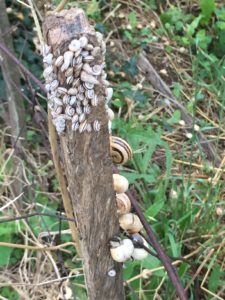 I passed a terribly rundown shack, an improvisation of found siding and patchwork roof coverings sunk low into a hollow between hills. A dog hurled itself against its chain, barking maniacally from the shadow of an old van parked out front. Eyeing the strength of the chain, I passed by quickly. BABOOM! The dog ceased his tirade, looked around, then started up again, sending me on my way. No cannons at the shack, I noted ridiculously.
I passed a terribly rundown shack, an improvisation of found siding and patchwork roof coverings sunk low into a hollow between hills. A dog hurled itself against its chain, barking maniacally from the shadow of an old van parked out front. Eyeing the strength of the chain, I passed by quickly. BABOOM! The dog ceased his tirade, looked around, then started up again, sending me on my way. No cannons at the shack, I noted ridiculously.
Learning something new is a mystery, a treasure hunt, a game of hide-and-seek. Just like when my grandma taught me to make quilts, you matched up scraps, holding small colorful bits together, stitching one short side so that now you made a connection. Joining your connected pieces, you could start to form a larger, more useful whole.
Now, I wore my new bikini to the Chicken Fiesta, by the beach, in Celorio. With festive scarf skirt wrap, of course. Mystery solved: cannons are a favorite way to celebrate fiestas in the small coastal villages of northern Spain. I saw the last bit of a traditional dance, lots of hop-stepping, drumming, and bagpiping, the ghost of a Celtic past peeking through, but now with castanets. The dancers’ rhythmic turning in traditional peasant costumes was hypnotic, as they stepped forward and back, encircling each other above the turning of the waves.
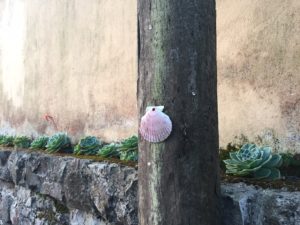 The Chicken Fiesta was a weekend family holiday, a midsummer excuse to eat – chicken – and play together. That was it; I asked several people. Just chicken…and being together.
The Chicken Fiesta was a weekend family holiday, a midsummer excuse to eat – chicken – and play together. That was it; I asked several people. Just chicken…and being together.
So today’s great concerns for me became evening out my peregrina farmer tan, and finding some chicken. I dozed on the sand under a soft sky, played in the waves with everyone else, got a glass of wine – and chicken – from the beachside bar, and dozed again on the sand. Because today was Chicken Fiesta. And today was Sunday.
I was starting to put it together. This whole day of rest/sabbath thing was brilliant. Just let it go. Leave your stuff and your backpack, your worries and your cares, and just live. Eat, drink, and be merry, for once in your life.
You can’t control everything. Really, anything. Who knew. BOOM.
* * * * * * * * * * * * * * * * *
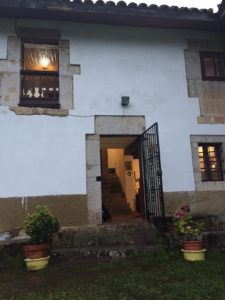
I was the first to arrive at the old rectory on the hill. Facing a wall of lush, green mountains, it stood quietly meditating in the mist, serene.
I knocked on the door, surprising the man inside, who came to the door to send me away and then realized with a start that a peregrina had arrived, sola. Embarrassed at his small mistake, he blushed red and checked me in, writing my name and passport number and birthdate and age (“cincuenta y uno?” “si, si”) and country (“Americana – bienvenidos!”) into the boxes in the grid across his page. Demographics checked, X marks the spot, he came to the final question: reason for walking the Camino?
Espirituál. He smiled approvingly.
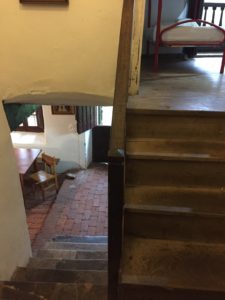 Giving me a tour, I felt happily at home. The main room was snug and warm, even with its brick floor. Upstairs, multiple small rooms held many bunks, with long, door-length windows between, shutters pulled open allowing the massive presence of the mountains to quietly enter. I chose a bed immediately up the narrow twisting stairs, and proceeded down to the herb-filled boot room to drop off my boots, and through the side door to the outdoor showers, each enclosed, in the walled garden where I could wash my clothes and hang them under the portico.
Giving me a tour, I felt happily at home. The main room was snug and warm, even with its brick floor. Upstairs, multiple small rooms held many bunks, with long, door-length windows between, shutters pulled open allowing the massive presence of the mountains to quietly enter. I chose a bed immediately up the narrow twisting stairs, and proceeded down to the herb-filled boot room to drop off my boots, and through the side door to the outdoor showers, each enclosed, in the walled garden where I could wash my clothes and hang them under the portico.
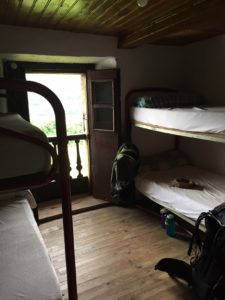 Clean, refreshed body and soul by showers of water and of words into my notebook, I sat at the large table in the main room, adding shells to Saint Thomas. Everywhere I had brought my walking stick, he became an instant conversation starter, a Camino talisman in his own right, as he was covered with the generosity of peregrinos. Everything about him was a gift, from his colorful orange cord, then a cotton string the color of peaches, onto which I had hooked one of the tauburu earrings from Begoña, and now aqua-hued plastic cord to tie the shells of las playas onto him. Even the tree I snapped him from had given him to me. Saint Thomas was my daily reminder of the adage we were all learning to live by: the Camino provides.
Clean, refreshed body and soul by showers of water and of words into my notebook, I sat at the large table in the main room, adding shells to Saint Thomas. Everywhere I had brought my walking stick, he became an instant conversation starter, a Camino talisman in his own right, as he was covered with the generosity of peregrinos. Everything about him was a gift, from his colorful orange cord, then a cotton string the color of peaches, onto which I had hooked one of the tauburu earrings from Begoña, and now aqua-hued plastic cord to tie the shells of las playas onto him. Even the tree I snapped him from had given him to me. Saint Thomas was my daily reminder of the adage we were all learning to live by: the Camino provides.
As I tucked him away under my bunk, who should arrive but Saulomon and Karolin. “Barbara! Come on, come on – I am going to make a feast! Come, join us in the kitchen,” Karolin grinned, arms wide for hugs. So, as Karolin cooked pasta, adding some tomato, a bit of green pepper, a small onion, a little garlic, Saulomon and I made a salad. I contributed the last of my sunflower seeds, and a small tangerine. And all the while, we talked of nothing, and everything.
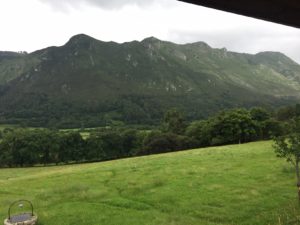
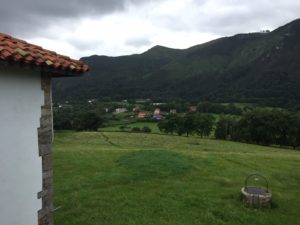
November 24, 2017 / wanderinglightning / 0 Comments
Gorma could tell, before she arrived one afternoon, that she was approaching a farm by the sea. Fields of corn and meadows of sweet grass filled a hillside. Fences of split wood and sturdy wire surrounded the fields, and kept the cows and sheep in their pastures, safe and sound. She heard the ringing chop of an axe splitting wood somewhere nearby, and chickens clucking, and a goat bleating like a child with a chore they don’t want to do. And flowing over and under, around and through, came the mysterious smell of the sea.
As the road curved, Gorma followed, and soon came upon a farmyard with an old stone wall, a sturdy stone barn, and a stone and yellow plaster house supported by great brown wooden posts and beams. It stood solid and snug, and near the barn, Gorma saw two men, one splitting wood and the other stacking it. As she approached, the goat stopped bleating and chewed grass near the chicken yard. But the chickens never stopped clucking.
“That’s a lot of firewood for such a pleasant afternoon,” Gorma noted, nodding in greeting to the two.
“Yes it is, Gorma, yes it is,” agreed the stacker. He was lean and strong, like a forest tree, or a mountain stone, and just as dark and rugged and wise. “But you know, the weather changes, seasons too, and soon we will have need for a fire to keep us warm.”
The chopper CHOPPED! another log. He was muscular and strong, like a lion, or a wolf, and just as fair and rippling and intelligent. He said nothing, but his sharp ears and sharper eyes missed nothing, either. Like his axe.
They were brothers, Svend the stacker, Wolfgang the chopper. They had built the farm together, and being both so smart and strong, had kept it well, so well it grew, everything they needed and more that they could sell. They gave Gorma a cup of coffee and some toasted bread with strawberry jam, and as Gorma munched happily, she noted something else. “This is a large amount of work, even for two so strong as you. I would think you’d hire a youth to do the woodchopping, at least.”
And at that, Wolfgang CHOPPED! another log, his wolf eyes flashing. “Oh we did, Gorma, we did,” assured Svend, standing tall as a tree. “But, oh Gorma, Gorma – I think he is a mage.” And Wolfgang CHOPPED! another log.
“A mage, you say,” said Gorma, cocking her head in that way she does when she has many questions yet unanswered. “How do you know?”
“Well, he said as much,” said Svend, and Wolfgang rolled his eyes at that. “But also – Gorma, Gorma, he has the power to disappear.” And at that, Wolfgang set his axe down, took off his glasses and wiped them clean. He looked at Gorma and, cocking his own head as well, nodded twice.
“He does not run away, but disappears?” And Gorma looked around the farm in one wide sweep.
“It’s true,” Svend replied, “because he never misses breakfast in the morning. And here it is too wild a place and far too far from any town for him to run and not run into danger.” Svend pursed his lips together in a frown and shook his head. “We do not know how to manage him; yet, he won’t leave. Every day for over a week, every time we give him a task to earn his keep, like chopping wood –” and Wolfgang CHOPPED! another log – “he disappears.”
Gorma sipped her coffee. “I’m surprised that, though you both are smart and strong, he can outfox you in this way. Still, when we only use one tool when we have many, we are bound to run into little mischiefs we mistake for mysteries. So now,” said Gorma, leaning in conspiratorially with Svend and Wolfgang, “let us open wide the toolshed, shall we?”
Wolfgang CHOPPED! his axe into the chopping block, where it held fast, as he wanted it to, and he and Svend took Gorma to the toolshed door. Svend opened it for Gorma, and they all peered inside the dusty shed together.
“Yesss,” said Gorma, and she began to smile. “Yes, here’s everything you need.” So Gorma reached into the shed two times. For Svend, she found carpenter’s pencils, and a roll of thick paper used to patch a broken window until repaired. Svend looked at these items in his hands as Gorma reached the second time into the shed and brought out for Wolfgang the great furry bearskin their father had left them long ago. He held it up in front of him with both his hands, then looked at Svend, and Svend at him, then both at Gorma, puzzled.
“Well, shall we wait for breakfast tomorrow, or shall we find your mage and manage him this day?” Gorma asked with a wink, popping her last bite of jam on toast into her mouth.
They walked back up to the barn. In a bit of a theatrical voice, Gorma called, “Oh Svend, I wonder if you could make me a drawing of your farm here? It is so peaceful, and I would be so happy if I could have a picture of it on my wall. Make sure to include everything, yes? Every chicken and chopped piece of wood, so I remember well.”
Svend looked startled, but then smiled and gave Gorma back a wink of his own, and soon was happily sketching out some scribbles, every barn cat and bale of hay, steadily recreating the farm upon the paper.
“Oh Wolfgang,” Gorma called again, “you must be tired from your woodchopping. I’ve brought you ale, and thought, refreshed, you might like a short rest.” So Wolfgang quenched his thirst, and stretched out on the bearskin beside Svend, and fell asleep.
Gorma helped herself to coffee from the kitchen, and she brought Svend an ale as well. She waited nearby, sipping and humming, until his drawing was nearly complete, and Wolfgang stirred and woke. Then Gorma huddled down beside them, in the middle, speaking lower than before. “How go the scribbles, Svend?” she asked, for Svend seemed stuck on one small detail near the barn.
“Ah, Gorma, Gorma, what a day, what a beautiful day I’ve been having. What a joy it is to sit and draw the things I love.”
“And how about you?” she asked Wolfgang, who had risen to one elbow, lounging comfortably beside his brother, smiling from the bearskin now. He, too, seemed pleased.
“Hmmm,” she hummed, as Gorma looked around the farm, “then what could be amiss?” She smiled slyly. “Anything that isn’t right? Oh, now what could mar this day on your sweet farm?”
Now rested, Wolfgang’s lion eyes flashed brightly blue and brilliant, and his nostrils twitched because he’d caught the scent.
At the same time, Svend’s artistic eyes took a closer look; his fingers tapped his pencil on the paper near the barn like an axe to CHOP! the thing amiss from all his lovely work.
They stood together, pointing at – “The goat!” yelled Svend. And in that instant as it tried to run away, Wolfgang opened up his mouth and ROARED! Just like a lion.
Then the goat transformed before them all. And standing small within its place a boy, with ragged whiskers on his chin, who’d fooled them for a goat by acting as one. He was not quite a man, not yet, but neither was he a mage, those magic folk who help the moon to send us many dreams.
“The goat,” said Gorma calmly. “And a goat you’ll stay, bleating and whining about life’s necessary chores, unless….”
“Unless what?” asked the youth, in a shaky, goatlike voice.
“Unless you walk from this farm now, today, and never return. You don’t belong here, on this farm – you sought it out because it is so near the sea. You are no Mage – you are Magellan. Your chores are found on ships to sail the seas, to find new lands, and navigate by stars. Stop dreaming in the moonlight, little goat, of better tasks and better days. Go do your part – go live your life – the world awaits.”
And so, young Magellan walked down to the beach, where he found a ship ready for him, and away he sailed with a crew of fellow youths, for many months, and years, always chasing new horizons, distant lands. For Gorma knew that some have sea legs and some stride the earth, and different ones will grow in different ways, some with many rows to hoe, some with wild oats to sow, and some in need of getting their feet wet.
Svend and Wolfgang toasted each other with ale, and laughed out loud, and took the time to walk together every day – through the farm, over the hills, along the road, and out to the sea. There Svend would draw, and Wolfgang would rest content, watching the gulls fly over the waves, and every day, what delight they took in these small joys.
And sometimes, they would walk to the toolshed, open wide the door, and reach inside…for more. The best tools, after all, are those that help us do the tasks that make us our best selves.
But that was all to come, and now, as Magellan sailed off, Gorma walked on, quiet and smiling. She arrived at the next albergue just in time for a bed, for which she was very grateful, and she slept deeply. Outside, the chickens stopped their clucking, for it was the dark of night, and first the moon and finally, the stars, sailed over the albergue, the farm, and one small ship beyond the horizon.
Buen Camino, Wolfgang and Svend.
November 24, 2017 / wanderinglightning / 0 Comments
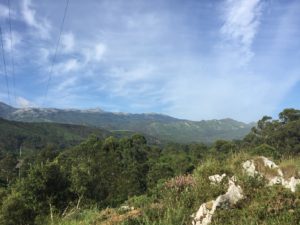
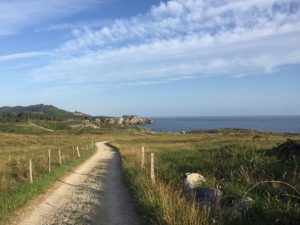
I found myself making up new words to old songs, singing endless rounds of such classic hits as Steve Miller Band’s clowns to the left of me, jokers to the right, here I am, “Stuck In the Middle With You”:
Camino is to walk in the way
that you want to walk every day
it’s so hard to get up out of this bed
and walk with all the stuff in my head
mountains to the left of me
ocean to the right
here I am
stuck on Camino with you
yeah I’m stuck on Camino with you
and I’m wondering what it is I should do
yellow arrows all point the way
unless they point the other way
mountains to the left of me
ocean to the right
here I am
stuck on Camino with you
well I started out with nothin’
and now I got nothin’ left;
when your back’s against the mountains
look at all the beaches
say hmm mm mm mm mm mm
hmm mm mm mm mm yeah….
If I was doing the Camino wrong, I didn’t wanna be right. Yesterday, it rained, rained desperately, like tears of grief that would never stop, and I spent the day covered, my pack covered, seeking cover during the heaviest downpours under porches of chapels, or cafe awnings where locals held the door open for me to come in, aqui, aqui. Hiking in the rain was a gray, solitary pursuit, ameliorated by my new rules of Camino play: rainy days are unlimited coffee days! I made a game of finding as many coffee opportunities as I could without deviating too far from the path.
Every time I sat at a long bar or a small table, and the bar man set my tiny white cup of thick espresso and cream before me, I smiled. Every single time. I smiled across the Atlantic Ocean, 5,000 miles west, toward my daughter in Boston. Emma. Her credo: always take time for a coffee. “Salud,” I would offer as my lips met the rim of the cup. Health…for us both.
Emma had been my traveling companion for a long time now, though she was only recently out of college and into her first professional job. My fourth child, of star-crossed passions, she streaked across our sky and beyond us like a comet. This fiery spirit stood defiant on all things worth fighting for, graciously folding her flaming phoenix wings and allowing me to approach her with tantalizing treats in my outstretched hands, such as her baby bottle of milk, or a cookie, or her blankie. Because Emma was the fiercest baby you ever met, a toddler standing firm against the impending doom of her mama counting, “1…2…3…” while her older siblings peeked around the corner in terror and in awe, whispering to each other, “Oh god, Emma – what happens at five? What happens at five?” She survived. If I put her in her room for a time out, she kicked against the door, hurling her tiny body against it, refusing to be confined, or silenced. She thrived.
My intimidation techniques had absolutely zero effect on the glory that was Emma. And so, seeing that I was outgunned, I gave them up. Instead, I resorted to bribery. Because the treat that most tantalized this tiny beastie – was coffee. Mother of the Year would feel a tiny tug on her pant leg, and look down from reading the paper to see an adorable face turned beseechingly upward, angelically asking, “Widdo taysee?” If she was behaving, then, with a practiced slurp, she got a little taste of my creamy coffee.
And thus we became pals.
By the time she was in middle school, we both enjoyed going to coffee shops. By high school, we were regularly meeting up there to write together, taking a hot sip and dashing off lines in a notebook to prompts we created on the spot. I loved to see her eyes flash as we listed three random words or phrases to be included and then said, “Go!” Scribble, scribble, scribble, her hand worked in rapid circles, while I dashed my slanting arrows into the list and then called, “Time!” Our agreement: keep it short. Our editing practice: don’t edit. Say it and be done with it. Next.
But we had a problem, and it was me. I got sick. Accustomed to good health, I had no regular doctor, so I pinballed from one to another as they tried to figure out what was causing my symptoms. Finally, a routine checkup pointed the way.
I had HPV. Not the easy kind, the kind that arrives like an awkward guest but then leaves and never returns. Not the embarrassing kind, the kind that gives you warts in places you’d really rather not have them and makes you feel like the awkward guest threw a filthy, disgusting, all-night kegger in your home, coming back periodically with the lie that this time, no parties, swear.
No, my HPV was the mean kind. My HPV was the clever, sweet-talking professional guy who brought you flowers and told you that you were the only woman in the world, and by the end of your relationship, he was standing over you in bed, ripping the blankets off at one in the morning and yelling that this conversation is not over yet. Because it wasn’t over yet. This abusive relationship would never end. I had persistent, high-risk HPV; it refused to leave, even if I got a restraining order and changed my locks. It was trying to kill me. With cancer.
When the older kids came home for Christmas, I went in for surgery, thinking to burn the HPV out. Homewrecker that it was, it hid, then created infection and mayhem. So two months later, I had another surgery, removing everything – not just cervix, but uterus, ovaries. Do it and be done with it. I would not lose this fight.
And neither would Emma. Just a kid in high school, 17-year-old Emma got herself to and from classes, to and from work. As the double-whammy effect of double-surgery anesthesia knocked my central nervous system around like a series of punches to the head, I made the medical circuit again, cardiology, neurology. And Emma hung in there with me, encouraging, smiling, offering me a little tasty coffee, from her job at the downtown coffee shop. She stood firm, scared but invincible, and at the end of the spring, we made it to her sister’s college graduation. And a few years later, I made it to her own college graduation, from Colorado all the way to the east coast, to Boston. Thousands of miles.
Emma was the baby soothed if I sang to her. I was performing on stages in Denver when she was born, and she refused to be left out of all those songs she’d been hearing in utero. So when she was an infant, I held her in my arms, under the spotlight, and I sang. I sang all my words, pain or joy, in all my tunes, melodious or melancholy, and she was right beside me.
Twenty-three years later, my gate was boarding at Logan Airport in Boston, the plane bound for Spain. Emma handed me a card, one we’d found together on my first trip anywhere, my trip to New York. The trip Emma encouraged and cajoled me into, so that I would finally travel.
Off you go.
And if things had been different
maybe you would have done this already
maybe you would have had different kids, fewer kids, no kids at all
maybe your life would have had a different story
maybe you wouldn’t care so much about people
maybe you would care more about people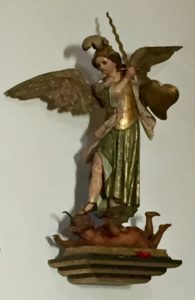
and still.
Here we are.
And this is your life.
Fly away and live it.
No kids at all. When I had my own glorious phoenix, standing guard over my dreams like a fiery, rebel angel sent from the stars.
* * * * * * * * * * * * * * * * *
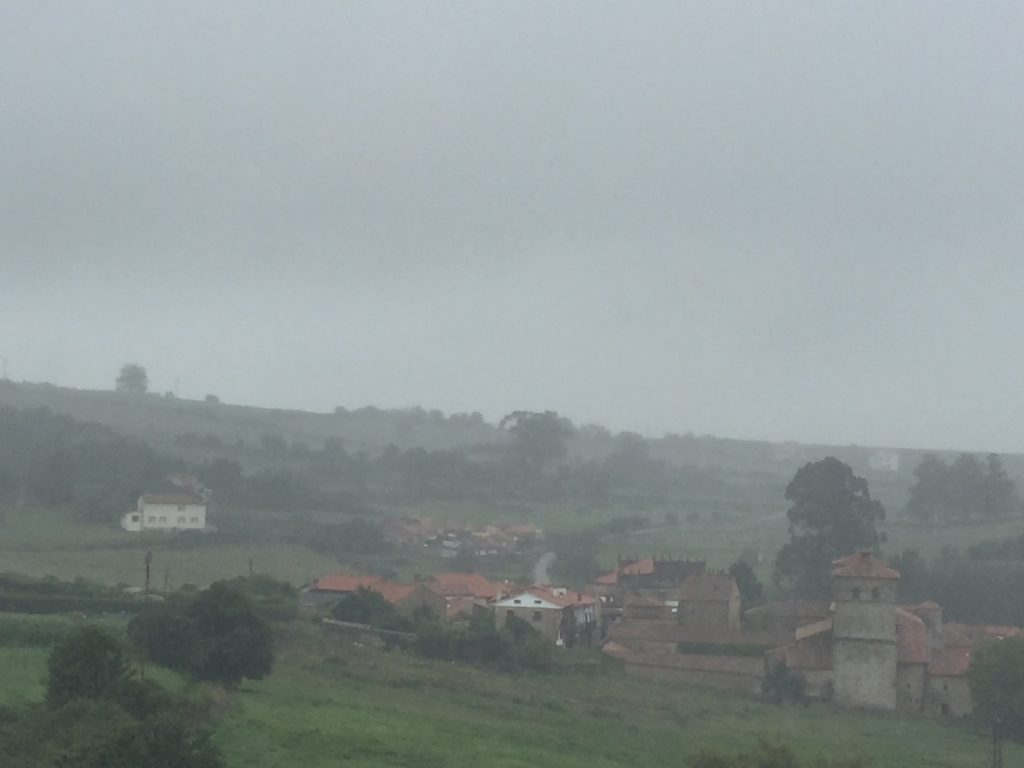 Instead of going to Pendueles, I stopped 2 km short. The rain was unrelenting, and as I hesitated at a crossroads looking for a sign, I heard my name: “Barbara! Won’t you come and stay with us?” It was Saulomon and Karolin, hanging out of an open second-story window over a bar.
Instead of going to Pendueles, I stopped 2 km short. The rain was unrelenting, and as I hesitated at a crossroads looking for a sign, I heard my name: “Barbara! Won’t you come and stay with us?” It was Saulomon and Karolin, hanging out of an open second-story window over a bar.
“Is that an albergue?” I asked, squinting as rain hit my eyes.
“Oh, yesss,” Saulomon purred, “warm and dry.” He grinned, delighted with himself.
“Yes, come!” Karolin called down. And so I came in out of the rain.
As my clothes and jacket and towel all spun in an unexpected clothes dryer, I stopped downstairs in the bar for a snack. I saw a beautiful, round cake that reminded me of Marisa’s. “What is the word for this cake?” I asked a peregrino beside me at the bar.
The bar man saw me looking and pointing. “Bizcocho,” he answered, adding more I could not understand.
“And it’s homemade,” the peregrino translated.
“Si, señor, bizcocho, y cafe con leche, por favor,” I told the bar man, who nodded. It arrived warm and satisfying. Salud, Em. I have to teach you this magic word: bizcocho. Emma was still traveling with me, beside me every step of the way, sharing every cup of coffee, her card bookmarking where I’d left off in my notebook, reminding me as I opened it that I was not alone. Go live your life. My pen began scribbling the slanting arrows of my thoughts into the prompts the day had provided.
To come in out of the rain is to finally gain some sense, they say; but in practice, it was not so much common sense I was learning, as trust. To seek shelter in a storm requires that you stop blindly struggling on alone, and find people who will stick with you, call your name, sing along. It’s to start to figure out that life can be easier than you’re used to, better than you thought possible. To find a place where you can feel safe, welcome to come in and warm yourself by the fire, or by the dryer, or by the homemade bizcocho, and coffee. Salud.
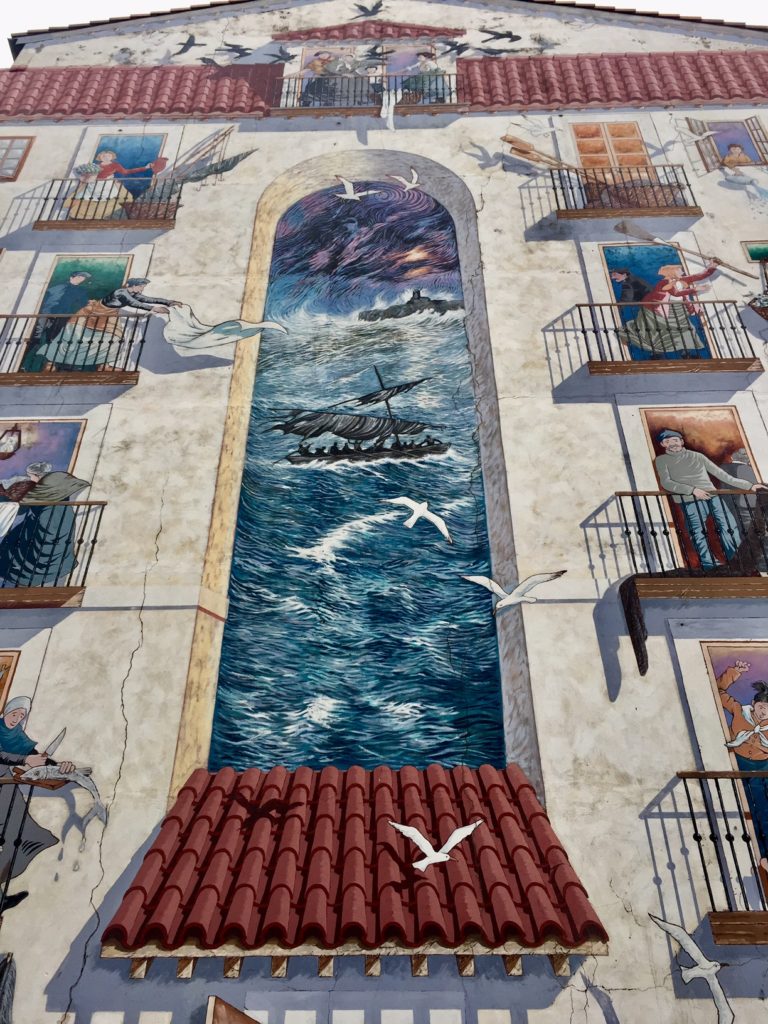
wall mural outside Santander
 I had walked with a slightly unbalanced pack, not wanting to halt my momentum to stop and readjust, and so now my left shin was hurting, especially when absorbing the impact of the downhills, and I had a long, steep downhill before me. Several, in fact. Kilometers of downhill.
I had walked with a slightly unbalanced pack, not wanting to halt my momentum to stop and readjust, and so now my left shin was hurting, especially when absorbing the impact of the downhills, and I had a long, steep downhill before me. Several, in fact. Kilometers of downhill. As I looked down the road, I was concerned, as a shin splint could lead to a stress fracture and could end my camino. Seventeen-year-old me winced at the thought, remembering stress fractures causing calcium deposits like goose eggs on both shins during my short-lived high school basketball days.
As I looked down the road, I was concerned, as a shin splint could lead to a stress fracture and could end my camino. Seventeen-year-old me winced at the thought, remembering stress fractures causing calcium deposits like goose eggs on both shins during my short-lived high school basketball days. I grinned back. Picking up Saint Thomas in both hands, I envisioned Max and I wearing top hat and tails, dancing with canes. This was it – our big musical number. With a nod, and one of Svend’s winks, I began singing along to the cadence, “bomp-bomp-bomp, BAH-dah,” and started dancing down the hill, first to the left, then right, then left again, angling jauntily down the steep inclines, laughing with Max. Feeling no pain. Not the coach’s “no pain, no gain” of my own teenage experience – NO pain. Just fun. Only a delighted, exhausted joyfulness.
I grinned back. Picking up Saint Thomas in both hands, I envisioned Max and I wearing top hat and tails, dancing with canes. This was it – our big musical number. With a nod, and one of Svend’s winks, I began singing along to the cadence, “bomp-bomp-bomp, BAH-dah,” and started dancing down the hill, first to the left, then right, then left again, angling jauntily down the steep inclines, laughing with Max. Feeling no pain. Not the coach’s “no pain, no gain” of my own teenage experience – NO pain. Just fun. Only a delighted, exhausted joyfulness. Yet my scrambles, over bewildering hills I did not mean to climb, had led me to my children. And these were people to whom I most definitely had nothing to prove. They had seen me in some of my most idiotic moments, and still loved and respected me. I liked to think that, because I took the time to explain my miscalculations to them, they felt a generosity toward their wildly improvising parent, while also learning that it was okay to make mistakes. But maybe they were just kinder than me. Or smarter. Or just healthier. They were people who seemed to take the high road naturally.
Yet my scrambles, over bewildering hills I did not mean to climb, had led me to my children. And these were people to whom I most definitely had nothing to prove. They had seen me in some of my most idiotic moments, and still loved and respected me. I liked to think that, because I took the time to explain my miscalculations to them, they felt a generosity toward their wildly improvising parent, while also learning that it was okay to make mistakes. But maybe they were just kinder than me. Or smarter. Or just healthier. They were people who seemed to take the high road naturally.






































